#the current writing process is monkey see monkey do with better writers
Note
hey Shal! So nice to hear from you! I'm happy to read that my words were received kindly, I was afraid I was a bit "too much" as I always am eheh :) I can maybe understand what you mean with having trouble with word finding and I can totally see you put a lot of care and thought into your work. But, honest to god, I don't read the "labor", the hard work behind things being thought out one way and coming together differently on the page. What I read is that you have a very distinctive style and it's a super smooth one at that (is writing for cinema or screenwriting in general a thing for you? I'll say it again you got the eye). And the dialogues are soooo, like, real! I said that I can maybe understand what you mean because I personally feel like my brain goes way way waaay too fast. Sometimes it's hard cause I don't feel like I can express myself like I want to and then people actually don't understand me so I get upset at myself and end up being unable to express myself even more and the cycle begins again... At university things were the same, my papers were always too "convoluted", my ideas were "too much", I lacked structure etc. It was very painful and made me feel like writing was not for me like at all. Which is bullshit, writing is for everyone. Now I don't know why I'm saying all this stuff, see? My brain is a mess, but I guess what I want to say is that whatever it is that you're doing with your writing process, you're clearly doing it great! It's a gift to be able to open up one's own imagination and show it to other people. It might not be easy(when things are, really), but it is a talent for sure and you got it!
take care <3
I personally feel like my brain goes way way waaay too fast.
Sometimes it's hard cause I don't feel like I can express myself like I want to and then people actually don't understand me so I get upset at myself and end up being unable to express myself even more and the cycle begins again...
At university things were the same, my papers were always too "convoluted", my ideas were "too much", I lacked structure etc.
That's exactly how it feels! Too fast at the wrong times, too slow at the wrong times. Other times, just static.
Word-finding is the worst, and then ppl wind up nitpicking when you choose the wrong ones and it can be soul-crushing like, "Oh no wait. That's not what I meant," matched with the mean-spirited, "But it's what you said and no takebacksies!"
Ah...anyway.
If you like to write, maybe we can join up on a writing sesh sometime in the future! The only cure I've found so far for all the cognitive dysfunction is making a habit of it...and having good company.
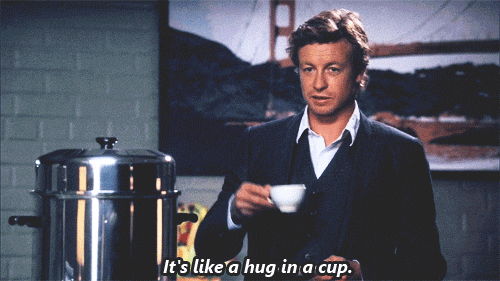
#writing friends#asks#writing stuff#cognitive dysfunction#and no - no cinematic experience but i do design and pitching keynotes in front of audiences so i think that counts for something#luckily they're largely techy audiences so they are easily swayed by empty promises and buzz words#the current writing process is monkey see monkey do with better writers#which mostly entails me hanging on to the back of a sled and screaming while we go down that icy hill
5 notes
·
View notes
Text
ARTIFICIAL INTELLIGENCE
AI is not intelligence, but rather marketing to exploit human labor, says Nicolelis
Neuroscientist claims that human intelligence results from millions of years of evolution: 'I want to see ChatGPT survive a Palmeiras game'
Pedro S. Teixeira
SÃO PAULO - ChatGPT functions as a marketing tool by generating inequalities in the relationship between employers and the workforce, says neuroscientist Miguel Nicolelis. According to him, intelligence is the result of millions of years of evolution, which cannot be computed in binary code. Nicolelis has been working with neural networks, the mechanism behind current machine learning algorithms, for 30 years.
As a reference in brain-machine interfaces, he has been involved in the development of neuroprosthetics capable of restoring body movements. During the opening ceremony of the 2014 World Cup in São Paulo, a wheelchair user kicked the ball into the goal with the help of a device developed by him.
Nicolelis states to Folha that it is absurd to claim that language models like ChatGPT are ten times more intelligent than a human being
just because they write quickly or communicate in multiple languages, as Geoffrey Hinton, a computer scientist who invented neural networks and was a partner and advisor at Google for over a decade, claimed. "The turtle is extremely intelligent; it's just slow."
You criticized the writer Yuval Harari. Why?
He mixes things from other areas without having in-depth knowledge. In Sapiens, he combines references and interprets our results in a way that has absolutely nothing to do with what we have done. It is work that I have spent 30 years of my life on. When he talks about the future where we will have this thing called brain-to-brain interface, which was an experimental thing I did with rats, monkeys, and humans for rehabilitation purposes. But it's not about exchanging feelings with other people. It's about exchanging motor commands, things suitable for reducing digital logic. He interpreted it as if I were reading someone's mind, which will never happen. He says things like "we will live up to 200 years," "we will end aging." It's all fantasy.
What about Harari's views on artificial intelligence?
He thrives on sensationalism. He wrote that artificial intelligence has hijacked the system; it has hijacked
nothing. The human species is hijacking its own evolution. Behind artificial intelligence, there are armies of people annotating data.
And there are armies of evangelists. I never liked that word because it denotes that the vast majority of human movements have turned into religions. Everything seems like a religion. From a scientific point of view, I've been saying this for years, and now Noam Chomsky uses the same phrase: artificial intelligence is neither intelligent nor artificial. It is not artificial because it is created by us; it is natural. And it is not intelligent because intelligence is an emergent property of organisms interacting with the environment and other organisms. It is a product of the Darwinian process of natural selection. The algorithm can walk and do things, but they are not intelligent by definition. If he were alive, Charles Darwin would have a heart attack over this.
Is it better to call it machine learning?
Machine learning, deep learning, and artificial intelligence are big terms that we have colloquially become accustomed to using, relating them to the human brain or any animal brain, to define things that we do with binary logic. Human intelligence is not binary. That's why it's an inappropriate name.
The creator of neural networks, Geoffrey Hinton, says he tries to simulate the structure of neurons to think about these algorithms.
He also makes a bunch of absurd comments.
He claimed that artificial intelligence is already ten times superior to human intelligence, which is absurd. We have these marketers in the technology field who claim things that seem true, but they don't have the evidence. He works with results. He talks about the speed at which he delivers answers, multiple languages.
The turtle is extremely intelligent. It's slow. But what we are trying to do is use market language to define what life does. The market wants things fast, efficient, with infinite profit and zero cost. Intelligence doesn't have that commitment. The intelligence of an organism is committed to making it survive as long as possible in a continuously changing environment. Just because a computer plays chess faster and beats a world champion doesn't mean it is intelligent. It is simply more efficient because chess is a game with predetermined rules. That computer cannot survive in Palmeiras Stadium during a game, it doesn't understand the reasons behind a fight because it doesn't have the capacity to generalize its intelligence.
The researcher from the Open Philanthropy Institute, Ajeya Cotra, estimated that in the current societal model, the human mind runs the risk of becoming obsolete by 2037 in terms of production for the labor market. Does that make sense?
It depends on what you define as production and obsolescence. There is a limit to digital logic. I just read a book by one of the top intellectuals in the field of AI, Michael Wildridge from the University of Oxford. It was published in 2021. In the book, he says: we know that there is a limit determined by non-computable phenomena, where there is no algorithm, no solvable mathematical formula with a program. However, he briefly mentions the most important thing in the book and comments that researchers don't pay much attention to it because they have too much to do.
But the human mind is filled with non-computable phenomena: intelligence, intuition, creativity, aesthetic sense, definitions of beauty, creativity – all of these are non-computable. What is the formula for beauty?
A young person posted on Twitter that her uncle was accused of plagiarism because a professor took a section of his work and asked if it had been done by ChatGPT for
ChatGPT. The platform is not designed to recognize if a text was created by artificial intelligence and always claims to be the author of any text.
In a way, ChatGPT is a big plagiarizer because it takes material created by many people, mixes it, and generates something it calls a new product, but in reality, it is largely influenced by the intellectual output of thousands and thousands of human beings. In the current modern capitalist system, artificial intelligence is a major marketing tool because it generates a complete inequality in the relationship with the workforce.
An employer can say, "I have an artificial intelligence application. If the worker doesn't accept the salary I am willing to pay, which is 10% of what they earn today, I will dismiss them and use the application." There is a whole ideology of replacing human labor, which cannot be done 100%, it's not possible.
Can we say that a more utilitarian thought is gaining ground in society?
That's the problem; it has nothing to do with the machine. What is happening is forcing human biology to follow market rules. Market rules are not divine; they are abstractions created by the human mind. What have they produced in the history of humanity? A tremendous income
distribution inequality. We have people spending money to dive and see the Titanic exploding in the middle of the ocean. If someone walks from Avenida Paulista to here, like I did, they will see tens of thousands of people dying of hunger on the streets. All of this is being ignored because these systems are convenient. They increase our productivity and our reach as human beings.
Are you more aligned with the view that these language models are more like statistical parrots? Absolutely. Deep learning is nothing more than neural networks with multiple layers, more layers, more neurons, and more connections between those layers. The brain does that too. However, it is impossible to simulate the biological mechanisms the brain uses to make decisions.
The brain consumes much less energy than AI supercomputers to deliver the same processing power. It is a process of optimization over millions of years. It's no coincidence that we descended from trees; it took 4 million years for us to start walking. It's a much more elaborate thing: 20% of the energy your body produces goes here [points to the head]. The energy of the brain can light up a lamp, more or less. It's an extremely optimized thing that has undergone drastic changes since life appeared on Earth. And it is not
computable. Alan Turing himself knew this, after proposing his thesis, he said: there are certain problems that my theoretical machine, which has now become the Turing machine and generated computers, will not be able to solve. And when I face this impasse, there is only one solution. I have to consult an oracle to make a decision. The oracle is a human being.
But within this competition between machines and humans, do you agree with the risks to the species mentioned by researchers and people in the technology industry? The risks are tremendous. These tools must be used under human supervision.
In the programming of an AI system, a person may request something without considering that the means to achieve the goal are undesirable. And what happens with the technology industry?
The risks are tremendous. These tools must be used under human supervision.
In programming an AI system, a person may request something without considering that the means to achieve the goal are undesirable. This is what happened with the computer HAL in Stanley Kubrick's film "2001: A Space Odyssey." Its mission was to reach a destination with the crew. They just forgot to mention that HAL couldn't kill the
crew. They overlooked the scenarios where the mission would be accomplished, but there would be no one left to witness it. When someone delegates a mission to something on their behalf, it won't be possible to offer that thing all the immediate restrictions due to evolution.
Can these mechanisms be useful in terms of research, like your studies in neuroscience?
I use neural networks to interpret patterns of real neural activity since the 1990s. Not the same networks as today, but simpler ones. It's a statistical method of pattern recognition.
These tools must be used under human supervision.
In the programming of an AI system, a person may request something without considering that the means to achieve the goal are undesirable. And what happens with the technology industry?
The risks are tremendous. These tools must be used under human supervision.
In the programming of an AI system, a person may request something without considering that the means to achieve the goal are undesirable. This is what happened with HAL, the computer in Stanley Kubrick's film "2001: A Space Odyssey." Its mission was to reach a destination with the crew. They just forgot to
mention that HAL couldn't kill the crew. They overlooked the scenarios where the mission would be complete, but there would be no one left to witness it. When someone delegates a mission to something on their behalf, it won't be possible to offer all the immediate restrictions that we have due to evolution to that thing.
Can these mechanisms be useful in terms of research, like your studies in neuroscience?
I use neural networks to interpret patterns of real neural activity since the 1990s. Not the same networks as today, but simpler ones. It's a statistical method of pattern recognition.
When someone delegates a mission to something on their behalf, it won't be possible to offer all the immediate restrictions that we have due to evolution to that thing.
Can these mechanisms be useful in terms of research, like your studies in neuroscience?
I use neural networks to interpret patterns of real neural activity since the 1990s. Not the same networks as today, but simpler ones. It's a statistical method of pattern recognition.
I don't agree with turning a statistical tool into a new God and building an entire religion around it, as is happening. I call it the church of technology.
https://www1.folha.uol.com.br/amp/tec/2023/07/ia-nao-e-inteligencia-e-sim-marketing-para-explorar-trabalho-humano-diz-nicolelis.shtml
0 notes
Text
Writing tag game
I was tagged by @elorianna @alexxturner-me-on and @lanatural-books - thank you! 🥰💖
How many works do you have on Ao3?
I have 54 works on AO3 and 73 on FFNet (though there’s a lot of crossover between the two). I’ve been at it for ten years now so the list of fandoms is broad to say the least...
What's your total Ao3 word count?
479558... I have a feeling my current WIP might push that over 500,000 🤯
What're your top 5 fics by kudos?
Watch Our Souls Fade Away (Infinity War/Guardians of the Galaxy)
Silence is Golden (Guardians of the Galaxy)
What Might Have Been (Coco)
A Father’s Pride (Guardians of the Galaxy)
Way Down We Go (Guardians of the Galaxy)
Do you respond to comments? Why or why not?
I try to! I always aim to say a quick thank you at the very least, because it always takes me aback when someone says something nice about my work. If I’m particularly busy or if there’s an overwhelming number of comments, I’ll at the very least leave a massive thank-you in the notes to everyone who commented 💜
What's the fic you've written with the angstiest ending?
God, I was such an angst junkie in my teens that I could give you at least ten examples. I’ve abused the Major Character Death/Tragedy tags often enough in my time... Of the ones I can actually remember, We Are The Universe is possibly the bleakest overall.
You’ve Always Been Here should be an honourable mention, considering the implications of that ending were so grim, I had to write a 38,000 word fix-it to make myself feel better 😅
What's the fic you've written with the happiest ending?
Most of my The Martian fics had nice, light-hearted endings. I also had a series called ‘Brothers in Arms’ based on the friendship between Sam Wilson and Bucky Barnes which ended with them as bickering old men, which is still an image I’m very fond of.
Do you write crossovers? If so, what is the craziest one you've written?
I’ve only written one (technically two but they’re part of the same series) which is You’ve Always Been Here. I guess it counts as crazy considering it was wildly self-indulgent and is more a crossover between two albums as opposed to the two bands (Muse and Arctic Monkeys) involved!
Have you ever received hate on a fic?
Not hate necessarily, but occasional comments that have rubbed me up the wrong way or left me feeling a bit deflated. One example I can think of is someone who read seven chapters of my story and the only comment they could offer was ‘I don’t like that (insert random event) happened, I would have preferred it another way’. Or you occasionally get people who only comment to nitpick on one typo in a 1000+ word story and offer no other feedback whatsoever.
Do you write smut? If so, what kind?
Nope! I can handle reading it regardless of the genders involved, but I am far too much of a blushing lesbian to ever write it for most of my favourite ships 😂
Have you ever had a fic stolen?
Not to my knowledge - I've had a couple reposted to other sites but they usually credit me.
Have you ever had a fic translated?
I’ve had a couple translated into Cantonese, and I stumbled upon a Thai translation of one of my stories once (they didn’t ask for permission but I was credited, so I just found it really cool).
What's your all time favourite ship?
Not sure I have an all-time favourite, but Milex currently own my heart.
What's a WIP you want to finish but don't think you ever will?
Thankfully the only unfinished WIP on my plate is one I definitely intend to finish! Still at the first draft/basic editing stage though so we’ll see 😉
What are your writing strengths?
I’m terrible at judging my own writing, but I think I’m pretty good at introspective character writing and I have a weird knack for emotional/intense scenes.
What are your writing weaknesses?
Too many to count. I’m absolutely terrible when it comes to wordy, run-on sentences. Especially with unedited first drafts - I could honestly put Charles Dickens to shame. I’m also pretty naff at dialogue, which is why I prefer writing moody introspective stuff.
What are your thoughts on writing dialogue in other languages in a fic?
I've incorporated occasional words in dialogue but never full lines, and only after ensuring I had the correct spelling/definitions. I probably wouldn’t be brave enough to do full lines of dialogue in another language.
What was the first fandom you wrote for?
My first ever fic was a Muse one which has long since been deleted. Weirdly it took me nine years to write for them again, though they’ve been an inspiration more times than I can count.
What's your favourite fic you've written?
I’m torn between ‘You’ve Always Been Here’ and ‘Watch Our Souls Fade Away’ and in both cases it’s more because of the enormous fun I had during the writing process than the quality of the fics themselves. I think the former is the better written of the two, but I’ll always be proud of the latter. The response it got was incredibly overwhelming at the time and I still can’t believe that a story centered around Nebula got so much love and attention.
Also whenever I look back on it, I’m astounded that I managed to write a 60,000 word story within the space of about 3 weeks. I want that motivation back...
I think most of my writer friends have already been tagged (except @rock-n-roll-fantasy but I don’t think you have an AO3!), but feel free to join in if you’d like a go 🥰
11 notes
·
View notes
Text
The Things That Have Gotten Me Through 2020
In the last few minutes of 2020, I thought I would share some of the little things that have brought me joy and comfort and, when both of those were in short supply, have dragged me forward through this year.
12 Monkeys (TV series)
I started watching the 2015-2018 SyFy series 12 Monkeys, which revolves around time travel being invented to stop a humanity-ending pandemic, in February or so, right before it became clear that the current pandemic was going to have a big impact on all our lives. It was... weird timing. Nevertheless, in the early days of lockdown, etc., all I wanted to do was curl up in a ball and escape by watching this ragtag group of idiots save the world and, eventually, Time Itself. They were, overall, very bad at it, always getting in their own way, but they won anyway, and that felt strangely encouraging. The show is not unproblematic at times, but its overall message is that, while endings are inevitable, the relationships we form and the choices we make matter. That was something I needed to hear and take to heart. Plus, the series introduced me to Jennifer Goines, one of my all-time favorite fictional characters. As played by Emily Hampshire (Stevie from Schitt’s Creek in a role as unlike Stevie as it is possible to be, at least in terms of self-expression), Jennifer is “brave, impulsive, irrationally rational,” and a force of radical love and compassion for her friends and, ultimately, for herself—even if her brain never works the way she wants it to. May we all try to live in the happily ever now.
Schitt’s Creek winning all the Emmys
Schitt’s Creek was my big discovery of last year, and its amazing character development in a story about finding oneself and forming connections in the process of starting all over was hugely important to me upon entering into post-academic life. This year, I’ve loved seeing this show’s snowballing popularity, which culminated in its sweep of the Emmy comedy category. Watching the ceremony at home with my cat, I screamed as those wins piled on (not as loudly as Sarah Levy up in Canada, but still). Legends Catherine O’Hara and Eugene Levy with their first acting Emmys! Dan Levy for writing and directing and acting on his first series doing any of those in a major capacity! Annie Murphy, for her hilarious and heartbreaking and inspiring and masterful portrayal of Alexis Rose, after she was told she couldn’t do comedy without comedy lessons and almost quit acting! The COSTUMES. No cast and crew have ever been more deserving. Love that journey for them! And the fan celebrations afterward were such an expression of communal joy at a time when joy and community were not so easy to come by.
Folklore and Evermore and Taylor Swift
It took me about a month to get around to listening to Taylor Swift’s first surprise pandemic album, folklore. Once I did, though, I couldn’t seem to stop. There were stretches of weeks when I only listened to folklore. It was for working and driving and writing and cleaning and thinking. It’s sonically soothing and lyrically gorgeous, pulling from literature, history, memory, isolation. I’ve never listened to an album where I can pick out so many favorite individual lines before. I’ve always admired Swift most for her storytelling, so it’s no huge surprise that I love this album, where she embraces the storyteller role. Still, I’d only really paid attention 1989 and her singles before—and not really even to her singles over the past few years. After about a month of only listening to folklore, all the time, like it had me hypnotized, I decided it might be worth listening through the entire Taylor Swift discography.
I fell in love with folklore as an album for its bittersweet, nostalgic feel that spoke so perfectly to this moment in time, but the exact moment I fell for Taylor Swift as an artist might have been when my jaw dropped at the cutting specificity of, “Don’t you think nineteen’s too young to be played by your dark, twisted game?” in “Dear John.” And then when I cackled as she wrapped up the song with, “The girl in the dress wrote you a song. You should’ve known.” That was when I started to appreciate Taylor Swift for the way she has, from a very young age, understood her power as a storyteller, and specifically as the teller of her own story. “I was there. I remember it,” she emphasizes over and over in song after song, seizing the authority she might otherwise be denied as a young woman (“when you are young, they assume you know nothing”). Plus, her use of imagery is unparalleled. folklore spoke to this moment in time, but there is a Taylor Swift song for every possible moment and mood, and that became a comfort and escape of its own.
So, by the time evermore came out, I was able to appreciate it as an event. And that, in these times, is no small thing. evermore is the wilder and sadder of the twin albums, and its songs revolve around endings and, on the other side, improbable hope. Here’s to this pain not being for evermore. Take a nap, Taylor. You’ve earned it.
Writing
At the end of grad school, I felt like I might never write creatively again. I was afraid that creative part of me had withered up and died. But last year, slowly, it started to come back, and this year it’s been one of my main sources of joy. I’ve written thousands of words, and I’m actually enjoying the process of doing it and proud of the outcome. I know and understand why a lot of people have struggled to be creative this year, but for me, writing my way into another world where I am actually in control of what happens has been my favorite way of escaping this one. It’s all I want to do all day while I’m sitting at work, doing official correspondence. I’m even writing original fiction for the first time in ages, and you know what? It’s not nearly as scary or difficult as I was afraid it would be. Plus, I love talking about writing, sharing enthusiasm and working through problems, with friends. I’m not a fast writer, but I hope to do more of it, and find a way to do it more consistently, in 2021.
Texting with friends
I haven’t been perfect at it, but I made the decision at the beginning of 2020, before All This even really got started, to do a better job at keeping in touch with my friends. In a year when we’ve had to reconfigure so many things we care about, I can wholeheartedly recommend a weekly text with friends as a way of keeping those relationships and those people prominent in your life. Throughout the year, reaching out on a regular basis to the people I love—when I need them, when they need me, just to say hi—has deepened relationships I care about and has been a constant source of comfort, stability, and fun. So much emotional and physical good has come out of it for me and, I hope, for others as well. This is a part of the year I’m really proud of, and I intend to continue, expand, and refine this program in 2021.
Learning to cook things
At the beginning of the year, I set the modest goal of learning to cook one simple thing each month of the year. When so many other goals and aspirations got blown up, this is one I was able to keep to for the most part. The holidays got in the way at the very end, but I did learn to cook 10 new things this year. For a person who could cook almost nothing before, this is big progress. It worked so well that this is another program I intend to carry on into 2021.
My nephew
Last year, I was looking forward to the day when this kid would be able to recognize me. Last weekend, he came running to be picked up with a big smile when I came through the door and hugged me when I left. It’s possible that he thinks Aunt Erin With a Mask and Aunt Erin Without a Mask (the latter of whom appears only rarely) are two different people, but he loves both of us, and we love him. I can’t wait to see what he’s learned by this time next year. I hope the world is a friendlier place for him by then.
Happy New Year!
9 notes
·
View notes
Photo

A master’s lacking homage to a masterpiece
(Review of ‘Mank’)
*Warning: contains minor spoilers*
In recent years, Netflix have really upped their awards season contributions by giving either huge budgets, total creative freedom or a mix of these to some of Hollywood's biggest directors. In 2018 Alfonso Cuaron gave us his deeply personal and technically impressive 'Roma'. In 2019 we received Martin Scorsese's long and long-awaited epos 'The Irishman'. Both received 10 Oscar nominations, but both also struggled to invite their viewers fully onboard (The Irishman in particular). In 2020, Netflix is back with 'Mank'; this time giving David Fincher a platform to create a black-and-white love letter to screenwriter Herman J. Mankiewicz, the often overlooked writer of 'Citizen Kane'. 'Mank' has also received 10 Oscar nominations, but has Fincher learned from Cuaron and Scorsese by making a more inclusive film experience?
In the story we follow Howard, or simply Mank as he is mostly referred to, as he has been asked to write the screenplay for Orson Welles’ first film for studio RKO. Welles has received full creative control of his films and has head hunted Mank to be his writer. Mank - being trapped to his sickbed due to a car accident - is put under pressure by a strict time limit, his secretary Rita Alexander and Welles’ desire to keep Mank away from alcohol, to which he has succumbed for years. It is, however, through numerous flashbacks to Hollywood in the 30’s that we slowly unravel the true inspiration behind Mank’s now historic screenplay for ‘Citizen Kane’. Hollywood is - as the rest of America - suffering the consequences of the recession and the film studios are under pressure from decreasing ticket sales and the threat of a democrat (or socialist as they denounce him as) running for office in California. As hinted at here, ‘Mank’ tells stories of everything from the film industry and the process of writing a screenplay to politics, media and the blurred lines between these industries while adding some remarks on Hollywood’s male dominance along the way and plenty of easter eggs to ‘Citizen Kane’ itself. We rush back and forth between Mank’s writing process and the ghosts of his past, and it is definitely an advantage to either know quite a bit about this period of time or give the film a second watch to fully understand the details of the story.
As Herman J. Mankiewicz, Gary Oldman gives another transformative performance. Oldman is without a doubt an extremely talented actor, who it is always a pleasure to observe. As Mank he gives it everything he has as the drunken screenwriter who after having fallen from the stars suddenly end up producing his best work. His acting when Mank is at his most drunk, most uncontrollable is balancing just on the edge of feeling overdone, and I am having a hard time relating to him in these scenes. It is, however, in his more subtle scenes as when he realises the potential consequences of a quick remark about the power of the film industry in relation to politics or in his final conversations with people about his screenplay, that Oldman shines the brightest. Is it an Oscar-worthy performance, though? I’m not sure.
The other Oscar nominated performance is from Amanda Seyfried as the actress, Marion Davies, the mistress of media mogul William Hearst. Seyfried - as Oldman - gives everything and her character ends up being both more relatable and compelling than Oldman’s titular character. What she does is not overly showy, but she manages to create a character who is both seductive, funny and interesting, when it comes to her trying to find her place in the grand political and artistic puzzle that she has been caught in. The scene in which she refuses to help Mank, not necessarily because she disagress with what he’s asking, but simply to save her face, is in particular well-acted and saying for the character. Sadly, Seyfried is not given that many scenes or material to work with, and as such Davies remains a character that I would have loved to see more of and explore further.
In additional supporting roles, Lily Collins as Rita Alexander, Charles Dance as William Hearst and Arliss Howard as film producer Louis B. Mayer stand out the most. Lily Collins manages to give Oldman some competition in their scenes especially regarding Alexander’s missing husband, Ian. Not unlike Marion Davies, though, Alexander is never explored in depth. We get a much clearer idea of who William Hearst and Louis B. Mayer were. As Hearst, Charles Dance delivers an icy performance as the mighty media mogul, who unknowingly becomes the focus for Mank’s screenplay. Dance is always interesting and his turn as Hearst is no exception. Especially the scene in which he recites the parable of the organ grinder’s monkey is memorable and satisfying to watch. As Louis B. Mayer, Arliss Howard also gives an icy, yet more explosive, performance as a man in power. If I was a film producer who has worked with Fincher, I would probably look in the mirror an extra time after seeing Howard’s performance as Mayer. He - along with Fincher - creates a cynical and often two-faced character, who ultimately follows the money and influence despite preaching about the importance of his MGM family (only to ask them to half their wages in the following scene). As such Hearst and Mayer are used to portray the cynicism and moral corruption caused by money and power; a familiar topic for Fincher, who this time aims his cinematic weapons at his own industry.
Another guarantee from a Fincher film is his impeccable attention to detail and unapologetic perfectionism when it comes to the technical aspects of his films. And ‘Mank’ is no exception; above everything else it is a technical marvel. The vision to create the film as if it was made in the 40’s has been executed close to perfection. The black-and-white cinematography in 2.20:1 aspect ratio (wonder why they went for this rather than 1.33:1) is a feast for the eyes; the addition of reel-change circles as part of the “degrading” post-production of the visuals does feel rather gimmicky, however. I got the “old film” feel without that, but it is without a doubt a detail held dear by Fincher himself. I would have preferred to either not have them or for the film to have been shot on film, though. Especially since the production design is beautiful and manages to create a believable and buzzing Hollywood aesthetic, which didn’t need the additional digital ageing on top. The sound design works better, adding to the “old film” feel first of all because of the fact that it is in mono, but also due to it being deliberately recorded, mixed and toned to sound “old”. It feels less gimmicky than the visual aspects of the film. To round off the film’s sound is a close to perfect score by Trent Reznor and Atticus Ross, who once again proves their versatility by creating a playful score that oozes Hollywood in the 40’s.
Hollywood is also the main focus of the screenplay by David Fincher’s late father; a project close to the hearts of both father and son for years. But despite the endearing narrative of this aspect of the film, I cannot help but feel that the old Fincher’s script is one of the film’s main problems. It simply lacks focus and a structure that aids the story. The film is presented as the story behind the greatest screenplay of all time, but in reality it seems least interested in the screenwriting process. Of course, this holds a meaning too; about the different things influencing a screenplay, but instead it ends up standing on too many legs for it to be well balanced. The flashbacks do tell the overall story of Mank’s screenplay influences, but Fincher’s screenplay seems more interested in the politics, the film industry portrayal and the depiction of Mank’s inner demons. It never fully lands any of these plot lines to absolute satisfaction. The closest is the political story about the sudden invention of post-truth politics or “fake news”, which obviously is a comment to the current political climate. It features interesting thoughts on the ideas behind and consequences of this kind of political work, but it also distances me from the main plot, which is further sidelined by the - obviously deliberate, but questionable - lack of Orson Welles in the story. He is always in the periphery of the story, but never lands as anything but a caricature of the slightly arrogant wonder boy stripping our main hero from proper acknowledgement (for a long time).
Now, let's return to my opening question: is 'Mank' a more inclusive film experience than other Netflix awards season darlings such as 'Roma' or 'The Irishman'? Well… While 'Mank' has been the most entertaining of the three in my eyes, the regrettable conclusion must be a "no". Looking at the individual parts they are all exquisitely executed, apart from the disjointed screenplay, and the film is an immense pleasure to look at and listen to. Ultimately it is just less than the sum of all its individual parts. It has all the components to become a masterpiece, it just never weaves them into one. It is a party that we are never fully invited to. This does not mean that I do not applaud Fincher for sticking to his visions or Netflix for giving him creative freedom, I simply just wish they did not keep me at an arm's length throughout the 131 minutes.
3,5/5
#Film#Movie#Film Review#Movie Review#Oscars 2021#The Oscars#The Academy Awards#Oscars Warm Up#Mank#David Fincher#Gary Oldman#Amanda Seyfried#Lily Collins#Charles Dance#Arliss Howard#Atticus Ross#Trent Reznor#Best Picture#Best Actor in a Leading Role#Best Actress in a Supporting Role#Best Directing#Best Costume Design#Best Cinematography#Best Production Design#Best Makeup and Hairstyling#Best Sound#Best Original Score
3 notes
·
View notes
Text
Yugioh S3 Ep 12: Seto Discovers Hostile Takeover Tactics
For April Fools, I’m actually going to update this blog. I know, right? It’s been a little while.
I’ll have you know that, if I had more time, you were *this close* to getting a recap of this hot mess movie.
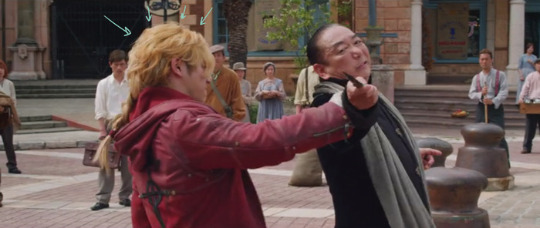
Buuuut it turns out that movie is a lot longer than I thought. Soooo many bad wigs. Maybe another April Fools.
Anyway, back to Yugioh, are you ready for MORE BUSINESS?
Cuz if you wanted to watch a kid’s show with stocks in it well, I had no idea it would be the one about the playing cards. Really didn’t see that one coming. Stocks are going to be traded in a little bit, but currently, all we have to worry about is that Tristan is a monkey and Kaiba’s about to die.
He seems cool with it, both with being “dead” (still unsure if Tristan can be human ever again) and watching Kaiba become dead.
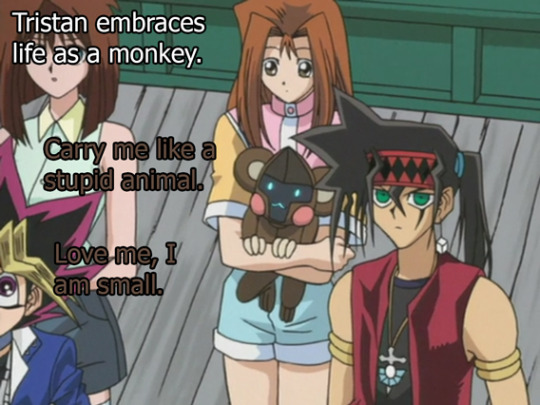
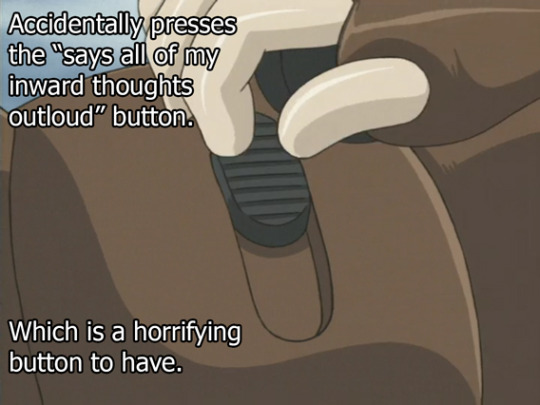
This is some high level freaky sci fi thing just stuffed into a side plot? Like...what purpose is the weird monkey robot?
(read more under the cut)
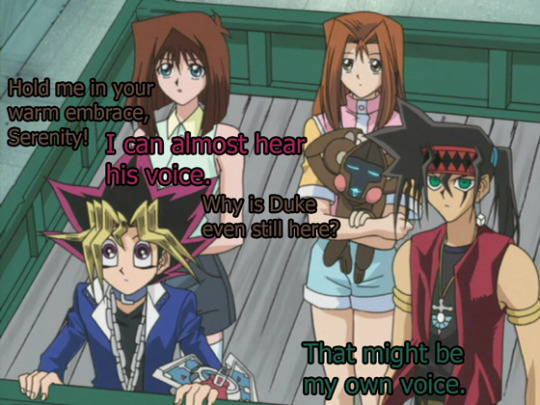
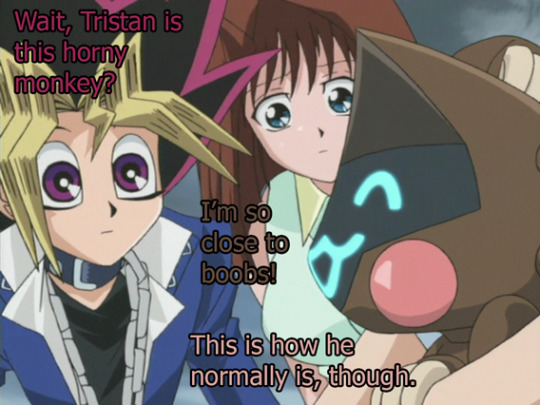

Joey has completely run out of his thimble full of patience, and he’s taken over the part of Den Mother in lieu of Tristan being too horny/monkey to manage it himself. Watching Joey slowly become more and more too frustrated to Even Deal With This Right Now has been his character growth this entire arc.
And the team’s somewhat amusement and concern that one of their best friends--who they saw...pretty much die--and is now a very horny monkey is like how you would notice that your engine light is on. Like they just have so many other problems right now. They’ve decided they will get around to deciding what to do about this...later.
They’re definitely going to deal with the monkey later. Eventually. So they just tied him to the truck and continue driving.
Like that’s what they actually did, they actually just tied him to the truck and kept driving.
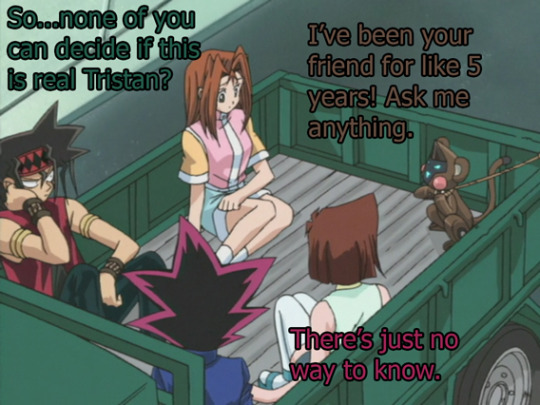
Eventually, they do make it to the scene of the Kaiba card crime in their 3 wheel pickup truck, but unfortunately, so does the weird satellite laser, so once again our team does not make it in time to really make any difference. The Yugi team is consistently like...3 minutes too late. Should be their team motto.

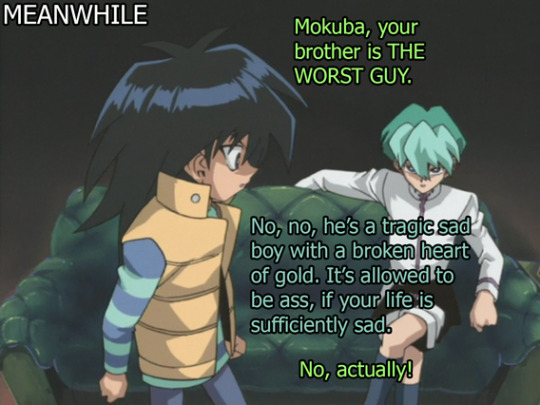
So Noah’s big plan is to make Mokuba watch Leichter--the hard to spell Big 5 with the very Dixie accent--explain in great detail all the ways Seto screwed Mokuba. And it was...something that I don’t think most kids would get. Last week it was a .com analogy, this week we’re straight up jumping into hostile takeovers. Seto decided to use the Big 5 to buy up a majority of the stock and fire his Father, but realized that Gozaburo would absolutely not let that happen.
So, Seto set up a whole plan to make it appear like he was losing the stock race, by leaking the whole plan that they were secretly buying allll the stock straight to Gozaburo but while pretending to be Mokuba (I assume by pinching his nose while shouting through a telephone) and then driving Mokuba to Gozaburo by attacking him point blank.
Did any children watching this show understand this? Did any of you?
Anyway, for some reason Mokuba is shocked that this happened.
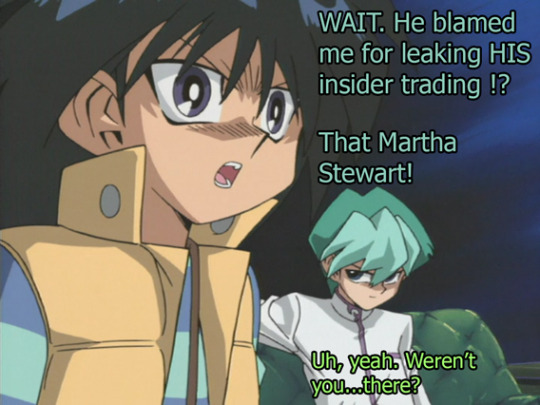
And then we get a flashback to remind us that yes, Mokuba was here when this happened. Maybe didn’t understand it at the time, but overall, should know by now that like...this happened. Noah revealing this to him really shouldn’t have been such a shocker, right?
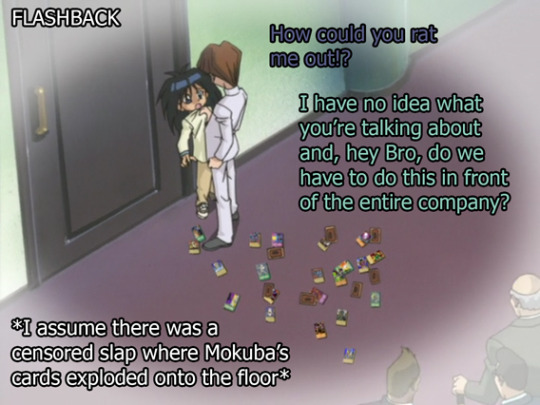

Mokuba describes it as “the worst day in his life” which is kind of a lot since two seasons ago Mokuba was chained in a castle cell for several days (possibly weeks), turned into a playing card while his body was a zombie that did dishes for Pegasus, died in a VR game because his brother couldn’t play nice, then last season, got abducted and then was suspended from the bottom of a flying helicopter by one single rope tied around his waist, was imprisoned in a box warehouse where he barely escaped, found out one of his good friends is pretty sure he’s an Egyptian Pharaoh dont-think-about-it, only to find all of his other friends were now attached to torture devices and about to be drowned in the bottom of the sea or squashed by a couple tons of cargo container. And then the next day, 3 people got sent to the hospital during the tourney he’s the manager of and only one of those people isn’t still in a coma, and now there’s at least one serial murderer on board his blimp and there’s nothing he can do about it.
But sure Moki, this is your worst day.
Convinced that Gozaburo (I will never spell his name right, PS, my apologies) thinks Moki is on his side, Kaiba decides to do the deed. In his school clothes. Not entirely positive that baby Kaiba has any other outfit than his school clothes and that purple coat.
Like did Seto get off school early to go and do this, or did he honestly clock in at 8 AM, harass Joey and Yugi for a bit, maybe take a test, turn in his diorama of mitochondria that he made out of twizzlers or whatever, eat lunch while making fun of the skater kids who botch it on the stairs, scribble some art in art class until 3 PM, and then take the bus back home to do THIS?
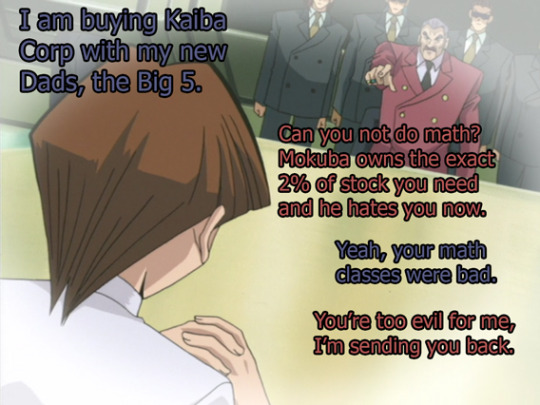
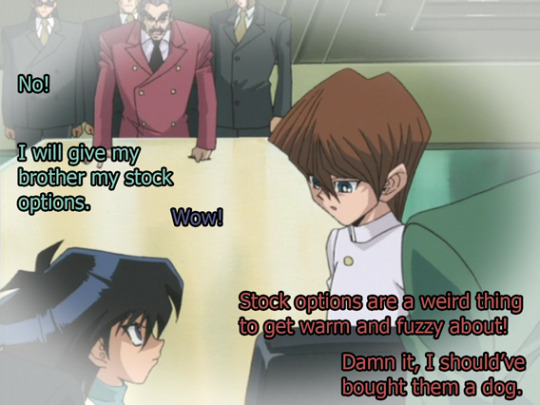
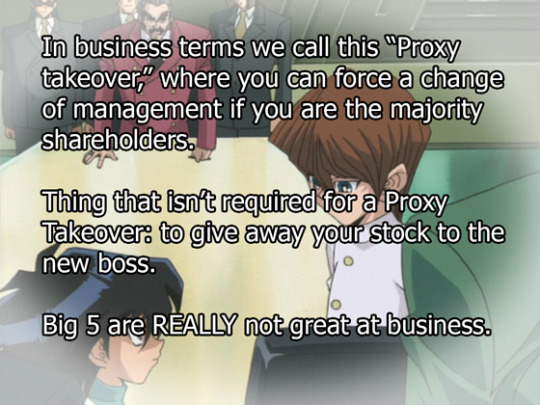
And so although the Big 5 were still majority shareholders, they couldn’t really control Seto Kaiba--which leads me to think that at some point he managed to get their stocks away from them...somehlow...probably more insider trading, he seems really into that.
Anyways, long story short the Big 5 really screwed it on this one. I mean the company has to be run by a Kaiba per the Kaiba rule that we learned in S1 (kind of a weird rule this family enforces, when all of the Kaibas are SO BAD at romantic relationships that they can only date trading cards, or can’t stop getting abducted long enough to even go on a date with a real human ((Reminder that Mokuba and Serenity are the same age, but he’s 1/millionth as horny as any of these High School Juniors that are into Serenity)))
Leichter (who is the light purple font here, I uh...forgot to cap Leichter’s face so it’s somewhat confusing) decided to just continue explaining, mostly for Mokuba, I assume, because...everyone here already knows what’s happening.
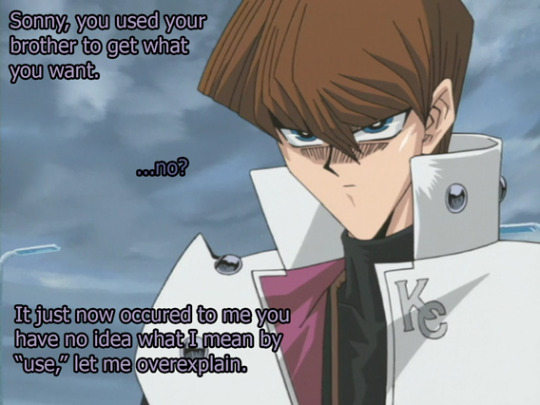


And at this point he reveals that he does have a Blue Eyes.
Again, very surprised Noah gave him that card but youknow...the power of...whatever the hell is going on there between Kaiba and that paper card.
Anyways, the Blue Eyes gives him a win, so I guess he’s figured out somewhat how to use this card? Like it’s significantly less bad than it was in the previous seasons. Maybe that separation between him and the paper card in S2 was good for him. Got his relationship back on track.

So like, something that is kind of vogue right now in more adult TV is this tendency to try and make all your characters relatable by making them realize and obsess over how they messed up to the point that they can no longer make any moral choices.
And that was the thing I was worried about in this arc, I was worried that the one guy on the writing staff who SUPER stans Seto Kaiba would make Seto into some sort of Bojack Horseman, who becomes so obsessed with his guilt that he kind of becomes a victim of what society did to him rather than a guy who ever made a choice. And Bojack’s not a bad show or anything, I did watch all of it, and it’s supposed to be more about society than the characters. But, as his problems from his youth compounded, he loses all of his agency as a character. If you are forced to be an ass then...well you can’t be one, by nature of what it means to be an ass.
Does that make sense? I see that more and more in shows these days, just a constantly apology fest whenever writers do a villain background episode.
But yes, Seto was trained to be a shark, but he was already a shark from day 1. He was always like this from the moment he was put in that orphanage. No apologies on behalf of the writing staff are needed and I’m glad they didn’t make any. It was somewhat refreshing that Seto never once apologized during this entire episode. He is awful, and he is completely fine with that.
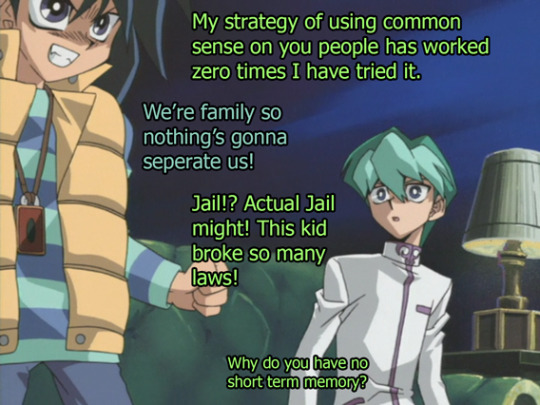
And like, Bro hates it when you do this type of parallel comparisons between characters, but I freakin love it because he might be an English major but he majored in technical writing, and I was minoring in film for a hot minute so I love analyzing stuff and he can just deal. So lets dive in. We just came off of a whole arc talking about Marik’s tragic backstory and it’s really interesting that Seto’s tragic backstory mirrors Marik’s a great deal (especially since Kaiba was the one who was supposed to inherit the magic rod) but the two of them have a very different response to it.
Marik’s background gave him absolutely no agency. Even when he did lash out against his father--that was the rod rather than Marik himself. He lost his nut because he got tortured by his Father and lived a very shelted life underground, there was no choice there. He even has a brother that he threw into the coals (well, stroke of lightning) for his own ambitions.
Seto, on the other hand, was also tortured by his Father, but lived a shelted life so far above everyone else, that he never really left that lifestyle. But, unlike Marik, when he got the chance to make a choice, instead of getting out of the Kaiba house to save his Brother, he decided to freakin destroy it, even if it involved torturing Mokuba (momentarily) in the process.
Both are destroying their Father’s legacy while also trying to rule the world at the same time, two different villains, two different ways, one isn’t necessarily better written than the other, but it does feel like Seto has a lot more control of his own life than Marik, who is currently bumming around in Tea’s brain.
But I dunno, maybe Seto will have a big moment where he will feel an ounce of guilt and we’ll find out that everything he did was secretly a good thing or The Only Way something. I might eat my words later and be somewhat disappointed. We’ll see.
If you just got here, this is a link to read these recaps from S1 Ep1, in case you felt like reading a novel’s worth of Yugioh, since we are on S3.
#Yugioh#yu gi oh#recap#photo recap#S3 ep12#tw abuse#seto kaiba#mokuba#noah#Yugi muto#Tristan as a robot monkey#Joey Wheeler#serenity wheeler#duke devlin#the three wheeled pickup truck#gozaburo kaiba#I think I've spelled his name every single way#because I'm tired of checking on google every 20 seconds#and spelling it wrong anyway#STOCK TRADING
20 notes
·
View notes
Photo

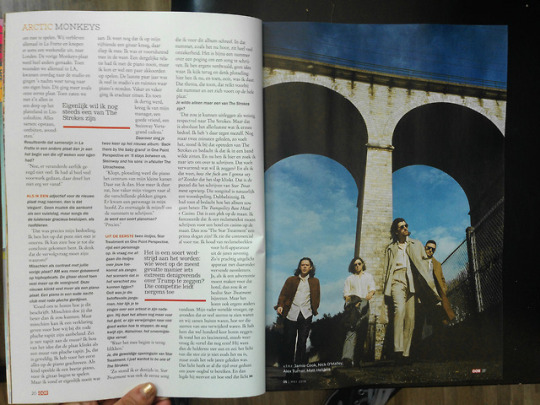
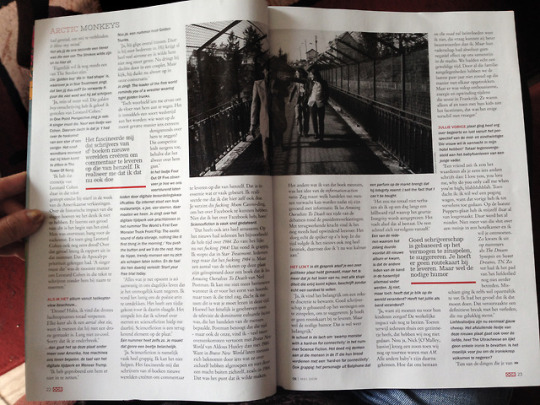
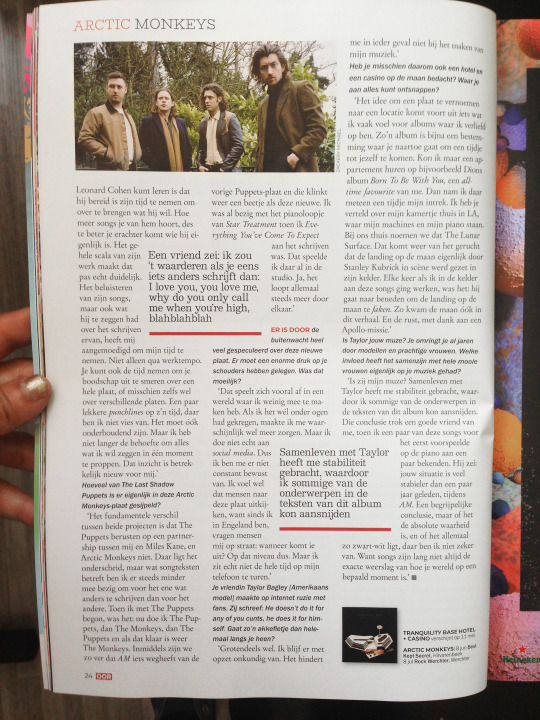
(translated by midsummersky)
OOR magazine interview: Arctic Monkeys
To the moon and back
Major Turner to ground control! From his Tranquility Base Hotel + Casino on the moon Alex Turner observes the digital human. He does that like no one else, the space cowboy from Sheffield. The sublime sixth album of Arctic Monkeys creeps up on the listener just as gracious as a feline predator. The sound is miles away from unruly, bouncy indie jewell Whatever People Say I Am That’s What I’m Not, the band’s debut record. A better reference would be Everything You’ve Come To Expect (2016), the second album of The Last Shadow Puppets. Turner’s side project happily flows into the waters of Arctic Monkeys. And vice versa. The one thing we’re absolutely sure of: as always, whenever that nifty Turner turns up, something peculiar is bound to happen. In the 11-song tracklist of Tranquility Base Hotel + Casino, one by one wonderfully melodic pieces, this magisterial word artist presents himself as the best writer of lyrics of his generation.
By Tom Engelshoeven // Photography: Zackery Michael
We’re not allowed to know anything beforehand. Not even the album title. Listening to the songs is allowed though. In a room of the Town Hall Hotel in London, a lady from Domino record company informs me that the new album has been recorded, mostly, in Paris and that Alex Turner is extremely involved in the production process. Then the 32-year-old singer enters the room in expensive designer clothing, including a military jacket carrying his name TURNER on the chest pocket. His shoulder-length hair is tied back in a short ponytail. And the goatee which has gotten an earful from the internet. You may think he’s lost his cool, but there’s little to notice about that in our conversation. In the hour that follows Sheffield’s most famous son, currently residing in Los Angeles, tries to carefully and accurately explain his thinking methods. In that attempt, he shows a pleasant kind of openness. He often loses his words, resulting in long quiet pauses in which he searches for the right way of explaining, yet there isn’t one second where I get the idea that he actually tells me everything he knows.
– So, France. In La Frette?
Yeah, La Frette is the name of the studio, but also of the town, La Frette-sur-Seine.
Surprisingly enough the internet is buzzing with rumours. It was often said that you would be working at some mysterious location. You’d been spotted in Sheffield, but Paris had never been mentioned.
It was a secret! I almost recorded a Shadow Puppets record in that studio, but we didn’t get to it. The producer had already come over to Los Angeles for a recording session, prior to this one. Now it was our turn to fly over to Europe.
You mean James Ford?
Yes. I started writing and recording this album in my own little homestudio in LA. We took those recordings to a real studio where we continued working on them wth James and the rest of the band. In September we made our way to the studio in La Frette to really tie it all together and finish it.
How long did that take you altogether?
About five weeks. In the first two weeks it was just us, the band, to rehearse everything. After that James Ford and some other friends came in to play as well. We all stayed in La Frette and only sometimes got out to spend a weekend in London. The previous Monkeys record we made in a very different way. Back then, we all lived in LA, spent the day in the studio and then went home in the evening. Obviously this time it was not like that. Back then, we were all in a town in the midst of farmlands in Lincolnshire. Doing everything together: getting up, having breakfast, dining out.
Did spending all that time together in La Frette result in a different kind of record from the one you had in mind at the start of recording?
No, to be honest it didn’t change that much. I already did a lot before we started, so it didn’t deviate that much.
– If I had to find an adjective for this new record, it would be ‘elegant’. It’s not music that bangs on your door, but songs which creep up on you like predatory animals.
That was exactly how I wanted it to sound. I can’t disagree with you, I can see how you’ve managed to draw that conclusion. I guess your next question is going to be ‘why’?
Maybe in contrast to your previous album? AM was heavily based on hiphop beats. The guitar really took up the spotlight back then, but this new record sounds much more like a piano record. A piano in an old nightclub with those red, velvet curtains.
It’s good to hear you describe it like this. Maybe you’re even better at that than I am. But perhaps I can give an explanation for how we’ve gotten to this red, velvet carpet? Did you say a tapestry on a wall? I like the idea that this album sounds like a wall of velvet tapestry. Yeah, that’s rad. For the first time, I wrote everything on the piano. When I was young, I played a bit of piano before I got to the guitar. But to be honest with you, I was never that good at it. I remember getting that guitar for my 15th birthday, I slept with it in my bed that night. I was constantly busy noodling around on it. Such a relationship I’ve never had with the piano, but I was able to play a couple of chords. For the past couple of years, I’ve visited a lot of studios and spaces where there was a piano available. More and more often I sat down at them and when I turned 30 I got one from my manager, a good friend of mine: a Steinway Vertegrand.
You’re singing about it twice on this album, if I’m correct: ‘Back there by the baby grand’ in One Point Perspective, and ‘It stays between us, Steinway and his sons’ in album closer The Ultracheese.
That’s right, suddenly that piano became the epicentre of my small room. And there I was. The more I was sitting there, the more my fingers slipped to various places. A kind of character was born in my head. That way I convinced myself to start writing songs again.
You became a piano man?
Exactly.
– From the first two songs, Star Treatment and One Point Perspective, a character starts to grow. I’m wondering, are those songs perhaps about your future as a singer: a scenario that’s looming in the future? Once upon a time you used to be that extremely promising young lad, but on here you sound like an artist singing about his bygone days.
It starts with looking back.
Yes, that excellent first line: ‘I just wanted to be one of the strokes’.
That was really how I looked at it back then. Star Treatment was the very first song I wrote for this album. In that song, as I hear it these days, there is a lot of uncertainty. It’s almost a song about an attempt to write a song. I’m lost somewhere, no idea whereabout. I’m reflecting and suddenly thinking: ‘here I am right now, and long ago, I used to be there’. That theme and that tone, it reaches past this one song and continues on the whole record.
You just wanted to be one of The Strokes?
You could explain that as not so respectful towards The Strokes, though that was absolutely the last thing I meant to say with it. I just told myself. Just two minutes ago, or so it feels like it, I was standing in the crowd for one of their gigs and I thought I wanted to be in a band. And now I’m here and searching for something to write about. That feels very confusing: what do I want to express? And when I’ll know, how the fuck am I going to say it? Without it sounding washy. That’s the puzzle which sparked writing Star Treatment. The title is, of course, a play on words with a two-sided meaning. In that time and place, I had already thought about what the album was gonna be called: The Tranquility Base Hotel + Casino. It’s a place on the moon. I fantasised about writing a commercial text for a hotel and casino on the moon. In that case ‘The Star Treatment’ would have been the ultimate slogan! I can already visualise the commercial in my head. I love those commercial visuals for hi-fi devices from the 70s. Highlighted just like that, accompanied by neon lettering. Yeah, if I had to create and advertisement for a hotel, I would definitely put ‘Star Treatment’ in there. But it also comes from a different place.
My dad used to tell me, on evenings where the sky was really clear and we were outside together, how far away those stars were from us. I’ve hear him say that a hundred times. I thought it was so fascinating, again and again I asked him ‘tell me again!’. Then he would point out the brightest star and say: you’re not seeing the light of that star as it shines right now, but like it was many years ago. That light took all those years to reach your eyeball. And then he would explain how fast that light had travelled to blind me. It blew me mind.
Just like how one second you wanted to be one of The Strokes and then another you’re sitting here.
To be honest, I still want to be one of the strokes.
That ‘golden boy’ who’s in bad shape you’re singing about on Star Treatment, that’s you then? That confused character who doesn’t know whether he’ll ever write again.
Yeah, more or less. I believe I stole that ‘golden boy’ description from Leonard Cohen.
In One Point Perspective you’re also singing: ‘A singer must die’. Also from Cohen. That’s why I thought were singing about the future of a star or a singer. The unavoidable moment where he’s stuck in The Tower Of Song.
I put that line by Cohen in the lyrics because he died in the week of the American elections. I don’t think we need to talk about the historic impact of those days. There was a real feeling of despair in the air, like: this is the beginning of the end. Everyone was so upset, scared of the future. And then to top it off, Leonard Cohen passed away! That’s the feeling I’m reporting on in the song, that the Apocalypse had become a priority. ‘A singer must die’ was the most beautiful way to work Cohen into the song without having to drop his name.
– If I had to view the album from a helicopter’s perspective…
Drone! Haha, I really think drone recordings ruin everything. Every time I see an aerial shoot I just know it was a drone that did that. It’s just not cool. I’m sorry for interrupting, keep going.
… then I had to say this record is about the USA, about how computers and machines direct our lives, the language of the digital era and sir Trump.
I have tried so hard to keep him out of this.
Well, there’s a song called Golden Trunks.
Yes, he finds his ways to sneak in. He’s very skilled in that area. He’s getting enough air time as it is, and I didn’t want to grant him anymore. Now it’s just one verse that’s about him. But look, he’s even entered our conversation!
You’re singing: ‘Leader of the free world reminds you of a wrester wearing tight golden trunks’.
And still, something kept me from confronting him. It’s become a sort of competition: who’s got the most witty way to say something extremely denigrating about him? That competition is absolutely going nowhere, except again it’s about him.
In that song Four Stars Out Of Five you’re observing how we’re constantly letting our lives be led by digital devices. Like, there’s a nice restaurant on the internet, oh Gosh four stars, we need to go there. You’re also singing about the digital age in The World’s First Ever Monster Truck Front Flip: ‘The exotic sound of data storage, nothing like it first thing in the morning / You push the button and we do the rest’. How the young and hip are being herded like sheep. And the words that help them: ‘start your free trial today’.
Everything you just mentioned is so present in our daily lives, it’s impossible to ignore. I found it quite hard to dig up some poetry from that. It took me a while before I succeeded. The simple fact that I was writing about stars and science fiction has helped me. Science fiction is a recurring theme on this record.
One number is even called Science Fiction. You’re almost ridiculing that genre a little bit.
Yeah. Namely because science fiction is really funny most of the time. I just can’t help it. It’s so fascinating to me how writers of sci-fi books keep making up new worlds to comment on their own worlds. Essentially, that’s wat happens most of the time. I realised I am partaking in this as well. You’re inventing this Moon Casino thing to be able to talk about Facebook. Not that I’m actually talking on Facebook.
Science fiction is easily outdated though.
That’s something really amusing as well. On the news, everyone was raving on about 1948. Like, now it seems like it really is fucking 1948! It was so funny, I had to put it in Star Treatment. Everyone saying it’s fucking 1948. But a lot of the lyrics on this record are inspired by a book I read, Amusing Ourselves To Death by Neil Postman. I can’t remember when I first heard about it but when I read that title, I immediately thought: this is what you have to read in the modern age. Even though, it’s practically written when television was the most dominant factor in our lives. Postman argues how that time – but I think also ours – bears much more resemblance to Brave New World by Aldous Huxley than to 1948. Because in Brave New World people are letting themselves be molded by something they have called onto themselves and not by a power from outside, like in 1948. That was the point I wanted to make.
Something else I took form that book was the idea concept of the information-action ratio. Like, what actions are to be expected when people are being fed information. I read Amusing Ourselves To Death around the time of the presidential elections. Retroactively, I thill think of it as an interesting read. It really hit the bull’s-eye for me. In that time, I was fanatically keeping up with the news, I’m laying off that a bit for now.
According to our conversation, it appears as if you made a really politically-themed record but rather than that, you’re describing your life as of right now without really judging at all.
Yes, I think it is really important to preserve a sense of discretion. Good writing stills are based on the ability to suggest. You don’t need to provide a roadmap, but you do need a sense of humour. That is important, yes.
I laughed out loud at the line ‘swamp monster with a hard-on for connectivity’ in Science Fiction. It reminded me of all those people working in IT who really do pay their bills with their ‘hard-ons for connectivity’. What’s also funny is that character from Batphone who introduces a perfume called Integrity. ‘I sell the fact that I can’t be bought’.
It wouldn’t surprise me at all if one day I would drive past a billboard advertising a perfume called Integrity. It feels like it already exists in this world. The rest of the song just wrote itself.
One of the reasons it took you so long before this album was born, was because the other members of the band suddenly became fathers. You didn’t, obviously, but has that changed your view on the world? Has it changed you guys as a band?
Yeah, because they need to take care of their kids now! The real scope of the impact is yet to be defined. Touring around when everyone has got families at home, it’s something we haven’t done yet. Well, no. Nick [O’Malley, bass] had a boy when we were still touring around with AM. All the other babies have been born after that. How it has influenced our life on the road, I wouldn’t know yet. I think they’re more capable of answering than I am. But parenthood has had absolutely no negative impacts on our spending time in the studio. We had a fantastic time. Because of all those family happenings we hadn’t seen each other as often as we would’ve liked. But there was a great lot of enthusiasm, energy and excitement when we were in France. It’s just that sometimes they were facetiming with their kids.
– Your previous album was very much about lust from the perspective of someone at the end of his twenties. ‘I want that woman in my hotel room tonight!’ It’s the complete opposite of the baby monitor life of a young dad.
A friend once told me: I’d love it if you wrote something else than ‘I love you, you love me, why’d you only call me when you’re high, blahblahblah’ for once. That was when I thought: I’d like try because I had never done that before. On our last Puppets record I detached myself from that image, it was already lessening. Not that shit anymore about a girl in a hotel room and I want to meet you. That’s how I got to the songs The Dream Synopsis and Sweet Dreams, TN. I’d never walked the road of love that far along. Maybe I even exaggerated on purpose. It caused a definite fracture with the past, which pleases me.
Lovesongs become cheese really quickly, that’s just the way it is. The closing number which is also about love, is called The Ultracheese and appears to not contain a single hint of irony. Is it hard for you to ignore the irony factor?
Well, one of the many things Cohen teaches you is that he’s prepared to take time to deliver his message. The more songs you hear from him, the more you discover who he really is. It’s a large scala of oeuvre which makes that clear. Listening to his songs, but also his commentaries, has encouraged me to take my time. Not just in terms of working pace. You can also take the time to spread out your message over one whole record, or maybe even several records. A few nice punchlines here and there, that’s all right. But I don’t really feel that urge anymore to wrap all the things I have to say up in one short moment. This insight is relatively new to me.
How much of The Last Shadow Puppets has actually flowed on in this Arctic Monkeys record?
The fundamental difference between both projects us that The Puppets are based on a partnership between me and Miles Kane. That’s the distinction, but lyrical-wise I’m less and less thinking about what project I’m writing for. Back in the days, it was very much like: now I’m doing The Puppets, then The Monkeys, then The Puppets and when that’s done, the Monkeys again. In the meantime, we’ve come to a point where AM somewhat started resembling the last Puppets record. I had already been working on the piano loop for Star Treatment when I was writing Everything You’ve Come To Expect. That was when it all started to become more intertwined.
There has been a lot of speculation about this new album, maybe causing a lot of pressure on you. Was that difficult for you to handle?
That’s mainly part of a world I try not to stick my hands in. If I had heard anything about it, I might’ve been more worried. But I don’t really have any social media, so I’m not entirely conscious of it. I do feel that people have been looking forward to this record a lot because, since I’ve left the UK, people keep asking me: when is that record gonna come out? That level. But it’s not as if I’m looking at my phone every other minute.
Your girlfriend Taylor Bagley was trying to pick a fight with some fans, saying ‘he doesn’t do it for any of you cunts, he does it for himself’. Does that even reach you or not at all?
No it doesn’t, I try to stay out of it on purpose. In any case, it doesn’t bother me with making music.
Is that maybe why you’ve thought up a hotel and casino? To escape everything?
The idea to name a record after a place comes from how I feel about albums I really love. An album like that really is like a destination to reconnect with yourself. I so urgently wish I could rent an apartment on Dion’s Born To Be With You, an all-time favourite of mine. I’d pack my bags this instant and just leave for a while. I told you about that room with the piano in LA, right? At my place we call that room The Lunar Surface. It’s from that rumour how Stanley Kubrick just staged the whole moon landing in his basement. Every time I sat down to work on songs in my basement, I thought: he’s gonna come down to fake the moon landing any time now. That’s how the moon entered the story. And the calm, thanks to an Apollo mission.
Is Taylor a muse for you? For years now, you’ve surrounded yourself with models and great women. What kind of influence did those women have on your music?
Is she my muse, you’re asking? Living together with Taylor brought stability to my life, giving me courage to talk about certain things on this record. It’s a conclusion a friend of mine came to when I played a couple of new songs for a few friends on the piano. He told me: your life is so much more stable than some years ago when you had AM. An understandable conclusion, but whether it’s the absolute truth and whether everything really is that black and white, I’m not sure of. Because songs are not always an exact depiction of how your world is at that moment. •
#alex turner#arctic monkeys#am#tbhc#tranquility base hotel & casino#am interview#oor magazine#mine#GODDDDDDDD I'M DONE#again if you see any mistakes please let me know!!#it's extremely lengthy so i might've missed some and i'm happy to correct!
381 notes
·
View notes
Text
Couch to 80K - Week 4 / Day 4
I’m starting to feel like these episodes are too short and I’d like to write longer, which is an excellent place to be in and exactly what I hoped for when I started. And since each week of the course is designed to exercise a different group of writing muscles, I’m finding it helpful to note which days and weeks I’ve found easier to do and look forward to doing, and which ones seemed like more of a tooth-gritting slog.
The data is doubtless skewed by the fact that I started from None Words with Left Burnout and have been gradually warming up to writing as I go along. But even so, I think it does give some hints of where my strengths and interests lie as a writer, and which parts of writing I find least intuitive and easy to do. Which also helps me see what areas I could work on to improve my writing process.
For instance, making lists of ideas, brainstorming, free-writing, outlining, and otherwise writing “rough” (Week One) is not something I gravitate to naturally or look forward to doing, so I try to avoid as much of that as possible by simply launching into the narrative and figuring out the nuances as I go along. But that means that I lose momentum the instant I have to insert specific, telling details -- descriptions of minor characters, names of made-up plants or animals, bits of imagined history -- that are essential to building up my world but aren’t crucial to the main plot. Those are the kinds of things I could easily brainstorm in advance and save myself a lot of trouble, if I relaxed my definition of “real writing” and included a few minutes of free-writing and list-making in my daily routine.
The hardest thing of all for me, though, is to write spontaneously and without any self-editing (Week Two) -- to pour words out onto paper simply to see what ideas or phrases might be worth pursuing, while cheerfully embracing the possibility -- indeed the probability -- of those words being bad. I don’t want to write bad words, even in a first draft. I want to write the best words I currently have at my disposal, albeit with the understanding that they are not as good as they could be and that I will make them even better later on. And for me, that means writing slowly and thinking carefully about rhythm and vocabulary and specific, sensuous details as I go along.
It’s torture sometimes, I admit: there are many days when I feel like my brain is made of cheese and I know there’s a better word or turn of phrase but I just can’t find it. But there’s also a deep satisfaction in putting the right word in the right place that I really can’t live without as a writer. Even when I know full well it’s “just” the first draft and that paragraph or scene or even the entire chapter might get cut in the end anyway, I’m not sorry I wrote it as well as I possibly could. There are days when writing a particular bit of description or dialogue that I’m proud of is the only thing that keeps me from giving up on the whole draft in despair, so the appeal of just hammering out words like a monkey at a typewriter is very limited for me -- especially as I have no reason to believe, as a singular writing monkey, that anything I produce in that state will be useful.
That’s not to say there isn’t a legitimate time and place for that kind of uncensored, uncritical writing, though. I’m just not sure where it fits into my process yet, or whether I stand to gain enough that it’ll be worth the effort. We’ll see.
9 notes
·
View notes
Text
2018 fic year in review
thank you so much for tagging me @homosociallyyours !! this was really fun (and also a bit hard haha) to do ^__^
1. number of stories (including drabbles) posted to ao3: 19 (6 100 word seasonal drabbles, and out of the rest 4 are under 1k and 2 are chaptered but one of those is still a WIP)
2. word count posted for the year: 142,383 which is def more than i’ve written in previous years but my initial goal for this year was 200k and then i lowered it to 150k and then decided i should focus less on word count and more on actually finishing the fics lmaooo
3. list of works posted this year in order of posting:
the tesco fic (although i didn’t make the tumblr post until recently)
three spring drabbles (100 words each)
begin again [timestamp] (my only snowbaz fic in 2018)
we’re swimming with the sharks until we drown
SPHERICAL
got me an appetite, now i can taste it
Take a Chance on Me
Getting Naked on Camera (NOT CLICKBAIT)
my favourite colour is you
louis tomlinson’s completely 100% foolproof guide to snagging the fit bloke next door (3 100 word drabbles)
no better place than right by your side
days gone by (WIP)
love the cronch
zero to sixty
where the love light gleams
4. fandoms i wrote for: mostly one direction and by that i mean i posted a timestamp for a carry on fic from 2017 and the rest was one direction lol
5. pairings: harry/louis, simon/baz (ONCE)
6. story with the most hits: Take a Chance on Me with 10975 hits :o
7. story with the most kudos: Take a Chance on Me with 426 kudos
8. story with the most comments: Take a Chance on Me with 52 comments threads
9. work i’m most proud of and why: well Take a Chance on Me was both my first time doing a big bang as well as the longest thing i’ve ever written (twice the length of the previous longest!) and i’m still completely in love with the art for it courtesy of @vulpixlou and i def don’t go back to stare at it ever nope 👀👀
10. work i’m least proud of and why: i mean i could nitpick the hell out of my stuff and i know there are certain bits i would write differently now but at the same time i created something with my brain that didn’t exist before and that’s just too cool not to be proud of ¯\_(ツ)_/¯
11. a favorite excerpt of your writing:
this is from Take a Chance on Me (shocker) and i was having trouble thinking of my fave but then i was skimming through all of my fics and ngl i had forgotten about this bit but y’all i’ve been trying to work a Dramatic Airport Reunion into a fic FOR FUCKING EVER and i finally did it and i actually don’t hate it? (spoiler for the ending of Take a Chance on Me)
“See…” Louis starts. “See, there’s this guy. And, oh god, he’s an absolute twat. Wanna know what he did to me?” Harry nods faintly, and Louis, emboldened now, goes on. “So, I already knew who he was, right? I knew him, because he’d been in this god-awful boy band for years, and even if me bloody sisters hadn’t been so bloody in love with him, I’d still have known him, because he was just that famous.”
“I wasn’t that famous.”
“Don’t interrupt,” Louis chastises, and Harry mimics zipping his lips. “So this guy, I knew him, but he didn’t know me, but, fucking hell, I think someone forgot to tell him that, because there I was, minding my own business, when this kid just…” Louis giggles then, because the memory is just so ridiculous, “he just starts fucking singing to me, can you believe it?”
Harry shakes his head. “What a weirdo.”
“Right? The weirdest.”
“What happened next?”
“I fell in love with him.”
“What? That soon?”
“Of course not, Jesus, Harold. I’m not that pathetic. I waited the appropriate amount of time to fall in love, thank you very much.”
“Is that why you’re here, then?” Harry whispers. “Is it because you love him?”
“That’s part of it, yeah. I love him, and I love the way we just fit, and I adore his daughter, and our pets are friends now, and I think our sisters are best friends now, so they didn’t actually give me a choice, but do you want to know the biggest, most important reason?”
Harry nods quickly, so hard his chin bumps his chest, and Louis’ so fucking in love with him at that moment that these are the easiest words he’s ever said.
“I’m here,” he tells Harry, “because I was lying in my own bed, in my own house, surrounded by all my things, and all I wanted to do was go home.”
He’s yanked forward then, Harry’s fingers digging into his shoulders, and he barely feels the pain because it’s Harry, and everything’s good when it’s Harry. He’s babbling into Louis’ neck, and the only words he can make out are his name and “love you” and he shivers with the feeling.
Harry’s hair has grown out enough since the night Louis snuck in to see him that he can tangle his fingers in the strands. So he does, pulling Harry’s face away from his neck and pressing their lips together. Every kiss feels like an apology. Every kiss feels like home.
12. share or describe a favorite review you recieved: so this miiiiight be cheating but i received two comments on a fic i wrote in 2015 and it was kind of a surprise that something that old still held up and people still enjoy it? def made me feel better about my current writing and also anyone who quotes my fics back to me has earned my undying love and affection
13. a time when writing was really, really hard: i have adhd so p much always ahahaha
14. a scene or character you wrote that most surprised you: the entirety of “we’re swimming with the sharks until we drown” ngl because i struggled with the like… morally gray criminal-y elements? and portraying the two of them in such a different way while still staying in character which i like to think i nailed? hopefully lol
15. how did you grow as a writer this year? i don’t feel like a i have? but i’m also bias and hypercritical so maybe i did and just didn’t realize ahaha
16. how do you hope to grow next (this?) year: i want to enjoy writing again and i want to finish more fics and not let them rot in my docs because of self-doubt
who was your greatest positive influence this year as a writer: okay so first @amandaisnotwriting is the real MVP as she bears the brunt of my whining/complaining/drama queen moments as well as the fact that she listens (some would argue is forced to :p) and reads over fic for a pairing she doesn’t ship for a fandom she doesn’t care about 😂😂😂
@rainbowbaz always makes time to look over my fics even when she’s crazy busy and is honestly amazing and saves my fics from americanisms ahahaha
and FINALLY we met p late in the year but but @livingatthelairport ‘s comment on “the tesco fic” helped me out of a writing slump and now she’s become my cheerleader (and friend 💜) and that’s make a huge difference in my attitude towards writing! it’s also easier to write a fic for a specific person than worry about the opinion of a crowd which is def something i’ve been missing in this fandom rip
also to everyone else who has read my fics, listened to me rant about them or just helped the process along in any way at all this is a GIANT thank you!!
18. anything from your real life show up in your writing this year? i mean i can’t think of anything off the top of my head but a lot of my inspo comes from the world around me so probably lol
19. any wisdom you can share with other writers: there’s nothing wrong with feeling jealous of other writers because i’m not a fan of hiding feelings just because they’re ugly as long as you don’t let it fester and turn into resentment or make you bitter. there are a lot of factors that go into a fic becoming “big” in a fandom but honestly most of it is just random chance so don’t beat yourself up because someone else’s success is not your failure and it’s nice to get recognition for your hard work but if you’re writing solely for the feedback then you’re writing for the wrong reason and that will lead to the resentment and bitterness mentioned earlier
also if you compliment someone you say you like their outfit but if you complement someone then you complete them
20. any projects you’re looking forward to starting (or finishing) in the new year:
I’M GLAD YOU ASKED
these are all the things i didn’t start and/or finish in 2018 that WILL be completed this year
the cat fic
the doctor fic
the final three chapters of days gone by
penpal AU
Space. Florist.
teenage fanboys who are also best friends
baking blog fic
a short follow up to tacom
twitter drama fic
80’s/’high school’/secret admirer!AU
something based on yawning grave by lord huron
part three of the alien harry series
chocolate orange holiday fic
LA fic (wtwm)
70’s fic
monkey fic
i’m also planning to do the @larryabroad challenge again because i had so much fun with it last time :D
21. tag some writers whose answers you’d like to read:
p sure everyone has done this but if you haven’t then do it now! and also tagging @cosyblack k bc you’ve had a really good year even if i have beta bias 😂
this took waaay longer than i thought it would omg but it was nice to take a look back!!
3 notes
·
View notes
Text
As of today, we’re celebrating: 365 Yaldev posts, 4 years of this nonsense, and being exactly 7 years behind Beeple!
CELEBRATION:
365 posts! That’s one year of Yaldev! Well, if I had been writing one every day, which I absolutely haven’t.
It continues to be the case that looking back on posts even from less than a year ago, I think “man this sucks,” and I either know how to improve it at least a little bit while I’m there, or I can’t stand to even look at it and I just have to escape from it. I don’t feel too much pressure to fix the bad posts at this point; as of today, Yaldev’s been going for exactly four years now (if you skip leap days :thonk:), and in a sense it’s chronicled my progress as a writer during that time. Some entries have been modified since them, some changed entirely except for the name and art chosen. I think it only makes sense that reading through it in storyline order will be like traveling through different points of my creative skill, in much the same way as it means traveling through different points of Beeple’s art quality.
CIRCUMSTANTIAL UPDATES:
People I know in real life are bugging me to start a Patreon. It’d certainly be reasonable to start one now that I’m four years in, but I can’t justify setting one up without:
A more consistent creative output than I’m currently hammering out, so I’m not taking your money for less utility than I’m giving you
Something to offer patrons without compromising the project for non-patrons
Existing interest from some of my audience in throwing cash at me (dance, monkey!)
A possible solution to the first one is setting myself a bar: if I don’t write at least X words by the end of the month, I don’t receive anyone’s money for that month. Hopefully that makes people feel more comfortable backing someone inconsistent, since they’ll still receive their benefits during the down periods but not have to spend anything. For the second, I have ideas for what to offer, but they’d have to be on top of my current output rather than replacing it, so at present I can’t really work ahead on them without detracting from the main project. It’s hard juggling part-time school, full-time job, getting enough sleep, Yaldev, another creative project I have a stronger obligation to, a paper I’m writing for a conference, relaxation, and generic life stuff. That said, I could be happily coerced into making a Yaldev a higher priority if I have a financial obligation to a couple supporters. The real question is whether there’s any interest in that. I worry that when the project has gone on as long as it has, interest actually decreases over time if it’s seen as old news. On the other hand, maybe older followers have a sense of being with me since the early days, like they’re invested in this ride as well. I have little clue.
In any event, if a Patreon goes up, I absolutely won’t be shoving it in people’s faces at every opportunity, since I’m not in a position of financial need and money was never the point of this. The main project would continue to be 100% free, and benefits would only be for additional goodies; nothing you can currently see would be moved behind a paywall.
STATISTICS:
This is the fun part, lads! Get ready for some stats and some commentary!
Total Stories: 365
As should be obvious, all numbers are only for the point at which I'm writing this post. These only include the posts that are canon and which I wrote.
Project Age: 1460 Days
Exactly four years! I think it’s a fun coincidence that it lined up with the 365th entry.
How Long You Have to Wait, on Average, For the Next Post: Approximately 4 Days
My output has slowed down since the last update. Feelsbad, but I don’t hear much complaining and I hope that higher quality makes up for lower quantity. Even still, I’m trying to blitz through my to-do list and speedrun my coursework to make more time for this. I hope to eventually bring that down to 3.5, for an average of two posts per week across the project's history.
Readers Across All Platforms: 536 (107 on Tumblr, 135 on Facebook, 140 on Instagram, 154 on Reddit)
Howdy y'all! Thanks for being here and reading my steadily-improving crap. I really struggle with talking about my creative projects in real life, including Yaldev, primarily out of a self-trained instinct to shut myself up about it on the understanding that nobody cares—especially not other creative types, since we're all too invested in our own creation to pay much attention to others. I've been trying to overcome that, and you're helping me just by being here to read. That tells me there's potential in this and that it's something that at least some people genuinely want to see. Artists shouldn't attach their sense of self to their creations, but I can't help but feel validated through that.
At the same time, I do often fear that mine is the sort of content that just gets a like tossed at it for the pretty visuals on the way down the endless content scroll, without having made a real impression on anyone or created a lasting memory. I'll probably always have that worry, which comes as much from a disdain for general Internet culture as anything else. Late in 2020 I took a step away from social media, and I’ve only partially returned, with the result that scrolling through newsfeeds takes up much less of my time than it used to. Feels good. I’d encourage you to do the same, but then you wouldn’t be seeing my own crap as often. :^)
Stories Per Reader: Approximately 0.68
Makes it sound like a decent growth rate, if on average I'm getting one new follower per story half the time, and two new followers the other half of the time. I guess "good growth rate" is somewhat subjective and depends on your goal, but for me, having a tangible unit of increase for each feels good.
It’s actually a lot more variable than that, of course. Usually a given entry will either attract no new followers because I only put it up in my own spaces, or it’ll draw in a few if I post it to a space for content like mine.
Total Word Count: 89,721
I typically operate under the assumption that most novels are about 75k, while sci-fi and fantasy novels tend to be longer since their authors are physically incapable of shutting up, putting them at around 100k. We’ll definitely reach that, and it probably won’t even take that long.
Average Story Length: Approximately 246 words
The 245-255 range is what feels good to me. Part of Yaldev’s appeal compared to books, in theory, is that if you’re consuming it the normal way, you’re getting it in bite-sized chunks as part of your scrolling experience. So I theoretically prefer to keep them on the short side, even if in practice I actually go ham and write stuff that’s quite long. The average here is really being dragged by 100-word posts previously being a lot more common than they are now.
STORY PLANS GOING FORWARD:
So the most recent entry, Gemstones as Mana Sources, was Beeple’s art from February 15, 2014. Today’s exactly 7 years from then, so I actually have an easy bar now for whether I’m catching up to the dude or not.
When I started this project, I began with his art from July of 2014 and then started moving forward. I got to about September 2015 before I decided that I wanted to go hardcore and go through all his art from the very beginning, at which point I warped back to his art from the very beginning in 2008, and started going through it in chronological order. I think I made that shift back in 2019, and now we’re getting back to the era of his art that I actually started this project with. All of this is to say that soon you’re probably going to notice an uptick in the art quality, either to something new if you’re new, or to what it was like in the Good Ol’ Days™ if you’ve been following this for a long time. As mentioned earlier, I no longer feel super bound to what I’ve written before: I prefer maintaining consistency, but some threads not being tied up and some contradictions are fine. I think the biggest one is that the state of magic’s legality in the Ascended Empire has never been made super clear, but I’m actually okay with that. I know that in the Imperiomancy entry I mentioned how its use by officials varied depending on who held power in government, and magic as a whole could be an even more complex issue that varies by time as well as region. I unironically think that Yaldev is the kind of world that has room for headcanon, so while I’ll try to fix egregious errors, you’re also quite justified in having your own handwaves for my screwups.
I don’t have any updates for any of the storylines really, except for the stuff with Inzohm and the Lone Traveller, for anyone keeping up with that: consider all of it to be in rough-draft at the moment. It’s the kind of long-con story that I really can’t coherently tell the way I do with the rest of Yaldev, so everything I write for it is more like notes that I can later on collect, shuffle, remix and rewrite until it’s semi-coherent. Turns out that Yaldev has helped me develop a number of skills as a writer, but telling better character-driven narratives isn’t one of them—partially because my chosen process, medium and inspiration-artist doesn’t lend itself too well to such stories.
Thanks for being here. What I always wanted as a kid was for other people to be as excited about my worldbuilding as I was, and while I doubt I've hit that extent with Yaldev, I hope my work's had some impact on you, or that it has parts you remember and enjoy. If you have any questions or comments you’ve been too shy to put elsewhere, feel free to drop them here! If not, just stick around and I’ll see you again at post number 400!
0 notes
Text
How Much Equity Is in Your Home?

ITTIGallery/Shutterstock
Understanding home equity
When you take the current market value of your home that you receive after an appraisal and subtract it from the amount you currently owe on your mortgage, that’s your home’s equity. Your home equity is how much of the property that you truly own. This is the formula you will use to answer the question, “How much equity is in my home?” Knowing the amount of equity you have in your home plays a vital role in major decisions like taking out a loan for repairs, improvements or to purchase a new home.
How much equity do I have in my house?
To determine the amount of equity you have in your home, you need to have it appraised to get the market value. Once you have the home’s appraised value, you can figure out how much equity you have by subtracting that value from your current mortgage balance. Determining a home’s equity uses a simple formula:
The appraised value of the home – (minus) the mortgage balance = equity
For example, if your home appraises at $200,000 and your mortgage balance is $120,000, the formula for determining your equity would look like this:
$200,000 – $120,000 = $80,000In this scenario, there is $80,000 of available equity in the home.
What if my home value increases?
There are several reasons why your home-value increase is beneficial. If you need to borrow money for a renovation or addition to your home, an increase in value gives you more equity to do so. However, there are negatives to a value increase as well. If you’re refinancing and your appraisal comes in high, it can have a significant impact on your interest rate because lenders use the appraisal to determine the loan-to-value (LTV) ratio.
Can I have negative equity?
Negative equity in your home occurs if the value of your home is less than the total balance of your mortgage. Lenders reduce risks by ensuring that you aren’t borrowing more than 80% of your home’s total current value. If the housing market drops and your home’s value decreases, that could result in negative equity. In this scenario, if you want to sell your home, you’d have to pay the difference between what you owe and its selling price.
Understanding home equity with the loan-to-value formula
Financial institutions and other lenders use the loan-to-value ratio (LTV ratio) to assess your lending risk before approving a home equity loan. If the assessment is a high LTV ratio, that means it’s riskier and could cost the borrower more for the loan. For example, if the LTV is at least 80%, that means you’re more likely to secure favorable terms and lower interest rates. The formula for calculating LTV is:
Current loan balance ÷ Current appraised value = Answer x 100 = LTV
As an example, if your mortgage is $120,000, your LTV ratio calculation would look like this:
$120,000 ÷ $200,000 = 0.6 x 100 = 60%
Loan-to-value ratio and home equity loans
When you want to apply for a home equity loan, the loan-to-value ratio compares your home’s value to the amount of the home equity loan you’re trying to obtain. That means, if you’re currently carrying a mortgage balance, your loan balance serves as the basis for the LTV ratio.
An LTV ratio is important because it helps lenders determine if you qualify for refinancing. Lenders prefer seeing a low LTV to minimize risk. A high LTV ratio may indicate there aren’t enough assets to ensure your loan will be paid off.
An LTV calculation impacts your ability to get a home equity loan in many ways. For example, if it comes in too high, the loan appears riskier to lenders. If you default on the loan, the lender might have trouble recouping its loss when trying to sell the property. Other ways your LTV can affect you include:
Better interest rates: If your LTV comes in low, you might get better interest rates on your home equity loan.
Higher interest rates: There’s a potential for higher interest rates on your home equity loan when your LTV is high.
Higher monthly payments: Your loan terms could change dramatically due to high interest rates which, in turn, can strain your finances.

Monkey Business/AdobeStock
How can I improve my home equity?
It isn’t uncommon for your home value to decrease over time due to changes in the market. However, if your home value remains stable, there are many ways to increase its equity. First, pay down your mortgage’s principal, which will lower your loan-to-value ratio. Next, consider paying more than the required minimum mortgage payment to reduce your LTV ratio. Here are some additional techniques to improve your home equity:
Tips for improving home equity
Keep your home well maintained
Invest in wise home improvements and upgrades (research the ones that will give you the most value)
Enhance your home’s curb appeal
Frequently Asked Questions
How does home equity work?
As your mortgage balance decreases and your home value increases, you are building equity. In other words, home equity is the portion of your home that you own minus any outstanding debts.
How much equity do you need for a home equity loan?
Lenders require borrowers to have at least an 80% LTV ratio remaining after they receive a home equity loan approval. That means you must have at least 20% or more equity before going through the qualification process for a home equity loan.
What interest should I expect for a home equity loan?
Home equity loans have an annual percentage rate that lenders base on your credit history, income, home value, mortgage balance, loan terms and loan amount. If you have a home equity line of credit (HELOC), you’ll typically have a variable interest rate that is tied to the prime rate and is subject to change.
How long does it take to pay off a home equity loan?
Some home equity loan terms are as short as five years, while others can extend to between 10 and 15 years. The length of the loan also depends on whether or not you make extra payments.

Author Biography:
Jenn Greenleaf is a professional writer from Maine who also works part-time as a bookkeeper for her husband’s residential construction business. She specializes in writing about HVAC, commercial construction and other home-related topics.
The post How Much Equity Is in Your Home? appeared first on Freshome.com.
0 notes
Text
How Much Equity Is in Your Home?

ITTIGallery/Shutterstock
Understanding home equity
When you take the current market value of your home that you receive after an appraisal and subtract it from the amount you currently owe on your mortgage, that’s your home’s equity. Your home equity is how much of the property that you truly own. This is the formula you will use to answer the question, “How much equity is in my home?” Knowing the amount of equity you have in your home plays a vital role in major decisions like taking out a loan for repairs, improvements or to purchase a new home.
How much equity do I have in my house?
To determine the amount of equity you have in your home, you need to have it appraised to get the market value. Once you have the home’s appraised value, you can figure out how much equity you have by subtracting that value from your current mortgage balance. Determining a home’s equity uses a simple formula:
The appraised value of the home – (minus) the mortgage balance = equity
For example, if your home appraises at $200,000 and your mortgage balance is $120,000, the formula for determining your equity would look like this:
$200,000 – $120,000 = $80,000In this scenario, there is $80,000 of available equity in the home.
What if my home value increases?
There are several reasons why your home-value increase is beneficial. If you need to borrow money for a renovation or addition to your home, an increase in value gives you more equity to do so. However, there are negatives to a value increase as well. If you’re refinancing and your appraisal comes in high, it can have a significant impact on your interest rate because lenders use the appraisal to determine the loan-to-value (LTV) ratio.
Can I have negative equity?
Negative equity in your home occurs if the value of your home is less than the total balance of your mortgage. Lenders reduce risks by ensuring that you aren’t borrowing more than 80% of your home’s total current value. If the housing market drops and your home’s value decreases, that could result in negative equity. In this scenario, if you want to sell your home, you’d have to pay the difference between what you owe and its selling price.
Understanding home equity with the loan-to-value formula
Financial institutions and other lenders use the loan-to-value ratio (LTV ratio) to assess your lending risk before approving a home equity loan. If the assessment is a high LTV ratio, that means it’s riskier and could cost the borrower more for the loan. For example, if the LTV is at least 80%, that means you’re more likely to secure favorable terms and lower interest rates. The formula for calculating LTV is:
Current loan balance ÷ Current appraised value = Answer x 100 = LTV
As an example, if your mortgage is $120,000, your LTV ratio calculation would look like this:
$120,000 ÷ $200,000 = 0.6 x 100 = 60%
Loan-to-value ratio and home equity loans
When you want to apply for a home equity loan, the loan-to-value ratio compares your home’s value to the amount of the home equity loan you’re trying to obtain. That means, if you’re currently carrying a mortgage balance, your loan balance serves as the basis for the LTV ratio.
An LTV ratio is important because it helps lenders determine if you qualify for refinancing. Lenders prefer seeing a low LTV to minimize risk. A high LTV ratio may indicate there aren’t enough assets to ensure your loan will be paid off.
An LTV calculation impacts your ability to get a home equity loan in many ways. For example, if it comes in too high, the loan appears riskier to lenders. If you default on the loan, the lender might have trouble recouping its loss when trying to sell the property. Other ways your LTV can affect you include:
Better interest rates: If your LTV comes in low, you might get better interest rates on your home equity loan.
Higher interest rates: There’s a potential for higher interest rates on your home equity loan when your LTV is high.
Higher monthly payments: Your loan terms could change dramatically due to high interest rates which, in turn, can strain your finances.

Monkey Business/AdobeStock
How can I improve my home equity?
It isn’t uncommon for your home value to decrease over time due to changes in the market. However, if your home value remains stable, there are many ways to increase its equity. First, pay down your mortgage’s principal, which will lower your loan-to-value ratio. Next, consider paying more than the required minimum mortgage payment to reduce your LTV ratio. Here are some additional techniques to improve your home equity:
Tips for improving home equity
Keep your home well maintained
Invest in wise home improvements and upgrades (research the ones that will give you the most value)
Enhance your home’s curb appeal
Frequently Asked Questions
How does home equity work?
As your mortgage balance decreases and your home value increases, you are building equity. In other words, home equity is the portion of your home that you own minus any outstanding debts.
How much equity do you need for a home equity loan?
Lenders require borrowers to have at least an 80% LTV ratio remaining after they receive a home equity loan approval. That means you must have at least 20% or more equity before going through the qualification process for a home equity loan.
What interest should I expect for a home equity loan?
Home equity loans have an annual percentage rate that lenders base on your credit history, income, home value, mortgage balance, loan terms and loan amount. If you have a home equity line of credit (HELOC), you’ll typically have a variable interest rate that is tied to the prime rate and is subject to change.
How long does it take to pay off a home equity loan?
Some home equity loan terms are as short as five years, while others can extend to between 10 and 15 years. The length of the loan also depends on whether or not you make extra payments.

Author Biography:
Jenn Greenleaf is a professional writer from Maine who also works part-time as a bookkeeper for her husband’s residential construction business. She specializes in writing about HVAC, commercial construction and other home-related topics.
The post How Much Equity Is in Your Home? appeared first on Freshome.com.
0 notes
Photo

How Much Equity Is in Your Home? https://ift.tt/2vIBuNV

ITTIGallery/Shutterstock
Understanding home equity
When you take the current market value of your home that you receive after an appraisal and subtract it from the amount you currently owe on your mortgage, that’s your home’s equity. Your home equity is how much of the property that you truly own. This is the formula you will use to answer the question, “How much equity is in my home?” Knowing the amount of equity you have in your home plays a vital role in major decisions like taking out a loan for repairs, improvements or to purchase a new home.
How much equity do I have in my house?
To determine the amount of equity you have in your home, you need to have it appraised to get the market value. Once you have the home’s appraised value, you can figure out how much equity you have by subtracting that value from your current mortgage balance. Determining a home’s equity uses a simple formula:
The appraised value of the home – (minus) the mortgage balance = equity
For example, if your home appraises at $200,000 and your mortgage balance is $120,000, the formula for determining your equity would look like this:
$200,000 – $120,000 = $80,000In this scenario, there is $80,000 of available equity in the home.
What if my home value increases?
There are several reasons why your home-value increase is beneficial. If you need to borrow money for a renovation or addition to your home, an increase in value gives you more equity to do so. However, there are negatives to a value increase as well. If you’re refinancing and your appraisal comes in high, it can have a significant impact on your interest rate because lenders use the appraisal to determine the loan-to-value (LTV) ratio.
Can I have negative equity?
Negative equity in your home occurs if the value of your home is less than the total balance of your mortgage. Lenders reduce risks by ensuring that you aren’t borrowing more than 80% of your home’s total current value. If the housing market drops and your home’s value decreases, that could result in negative equity. In this scenario, if you want to sell your home, you’d have to pay the difference between what you owe and its selling price.
Understanding home equity with the loan-to-value formula
Financial institutions and other lenders use the loan-to-value ratio (LTV ratio) to assess your lending risk before approving a home equity loan. If the assessment is a high LTV ratio, that means it’s riskier and could cost the borrower more for the loan. For example, if the LTV is at least 80%, that means you’re more likely to secure favorable terms and lower interest rates. The formula for calculating LTV is:
Current loan balance ÷ Current appraised value = Answer x 100 = LTV
As an example, if your mortgage is $120,000, your LTV ratio calculation would look like this:
$120,000 ÷ $200,000 = 0.6 x 100 = 60%
Loan-to-value ratio and home equity loans
When you want to apply for a home equity loan, the loan-to-value ratio compares your home’s value to the amount of the home equity loan you’re trying to obtain. That means, if you’re currently carrying a mortgage balance, your loan balance serves as the basis for the LTV ratio.
An LTV ratio is important because it helps lenders determine if you qualify for refinancing. Lenders prefer seeing a low LTV to minimize risk. A high LTV ratio may indicate there aren’t enough assets to ensure your loan will be paid off.
An LTV calculation impacts your ability to get a home equity loan in many ways. For example, if it comes in too high, the loan appears riskier to lenders. If you default on the loan, the lender might have trouble recouping its loss when trying to sell the property. Other ways your LTV can affect you include:
Better interest rates: If your LTV comes in low, you might get better interest rates on your home equity loan.
Higher interest rates: There’s a potential for higher interest rates on your home equity loan when your LTV is high.
Higher monthly payments: Your loan terms could change dramatically due to high interest rates which, in turn, can strain your finances.

Monkey Business/AdobeStock
How can I improve my home equity?
It isn’t uncommon for your home value to decrease over time due to changes in the market. However, if your home value remains stable, there are many ways to increase its equity. First, pay down your mortgage’s principal, which will lower your loan-to-value ratio. Next, consider paying more than the required minimum mortgage payment to reduce your LTV ratio. Here are some additional techniques to improve your home equity:
Tips for improving home equity
Keep your home well maintained
Invest in wise home improvements and upgrades (research the ones that will give you the most value)
Enhance your home’s curb appeal
Frequently Asked Questions
How does home equity work?
As your mortgage balance decreases and your home value increases, you are building equity. In other words, home equity is the portion of your home that you own minus any outstanding debts.
How much equity do you need for a home equity loan?
Lenders require borrowers to have at least an 80% LTV ratio remaining after they receive a home equity loan approval. That means you must have at least 20% or more equity before going through the qualification process for a home equity loan.
What interest should I expect for a home equity loan?
Home equity loans have an annual percentage rate that lenders base on your credit history, income, home value, mortgage balance, loan terms and loan amount. If you have a home equity line of credit (HELOC), you’ll typically have a variable interest rate that is tied to the prime rate and is subject to change.
How long does it take to pay off a home equity loan?
Some home equity loan terms are as short as five years, while others can extend to between 10 and 15 years. The length of the loan also depends on whether or not you make extra payments.

Author Biography:
Jenn Greenleaf is a professional writer from Maine who also works part-time as a bookkeeper for her husband’s residential construction business. She specializes in writing about HVAC, commercial construction and other home-related topics.
The post How Much Equity Is in Your Home? appeared first on Freshome.com.
The Freshome.com Team
0 notes
Text
How Much Equity Is in Your Home?

ITTIGallery/Shutterstock
Understanding home equity
When you take the current market value of your home that you receive after an appraisal and subtract it from the amount you currently owe on your mortgage, that’s your home’s equity. Your home equity is how much of the property that you truly own. This is the formula you will use to answer the question, “How much equity is in my home?” Knowing the amount of equity you have in your home plays a vital role in major decisions like taking out a loan for repairs, improvements or to purchase a new home.
How much equity do I have in my house?
To determine the amount of equity you have in your home, you need to have it appraised to get the market value. Once you have the home’s appraised value, you can figure out how much equity you have by subtracting that value from your current mortgage balance. Determining a home’s equity uses a simple formula:
The appraised value of the home – (minus) the mortgage balance = equity
For example, if your home appraises at $200,000 and your mortgage balance is $120,000, the formula for determining your equity would look like this:
$200,000 – $120,000 = $80,000In this scenario, there is $80,000 of available equity in the home.
What if my home value increases?
There are several reasons why your home-value increase is beneficial. If you need to borrow money for a renovation or addition to your home, an increase in value gives you more equity to do so. However, there are negatives to a value increase as well. If you’re refinancing and your appraisal comes in high, it can have a significant impact on your interest rate because lenders use the appraisal to determine the loan-to-value (LTV) ratio.
Can I have negative equity?
Negative equity in your home occurs if the value of your home is less than the total balance of your mortgage. Lenders reduce risks by ensuring that you aren’t borrowing more than 80% of your home’s total current value. If the housing market drops and your home’s value decreases, that could result in negative equity. In this scenario, if you want to sell your home, you’d have to pay the difference between what you owe and its selling price.
Understanding home equity with the loan-to-value formula
Financial institutions and other lenders use the loan-to-value ratio (LTV ratio) to assess your lending risk before approving a home equity loan. If the assessment is a high LTV ratio, that means it’s riskier and could cost the borrower more for the loan. For example, if the LTV is at least 80%, that means you’re more likely to secure favorable terms and lower interest rates. The formula for calculating LTV is:
Current loan balance ÷ Current appraised value = Answer x 100 = LTV
As an example, if your mortgage is $120,000, your LTV ratio calculation would look like this:
$120,000 ÷ $200,000 = 0.6 x 100 = 60%
Loan-to-value ratio and home equity loans
When you want to apply for a home equity loan, the loan-to-value ratio compares your home’s value to the amount of the home equity loan you’re trying to obtain. That means, if you’re currently carrying a mortgage balance, your loan balance serves as the basis for the LTV ratio.
An LTV ratio is important because it helps lenders determine if you qualify for refinancing. Lenders prefer seeing a low LTV to minimize risk. A high LTV ratio may indicate there aren’t enough assets to ensure your loan will be paid off.
An LTV calculation impacts your ability to get a home equity loan in many ways. For example, if it comes in too high, the loan appears riskier to lenders. If you default on the loan, the lender might have trouble recouping its loss when trying to sell the property. Other ways your LTV can affect you include:
Better interest rates: If your LTV comes in low, you might get better interest rates on your home equity loan.
Higher interest rates: There’s a potential for higher interest rates on your home equity loan when your LTV is high.
Higher monthly payments: Your loan terms could change dramatically due to high interest rates which, in turn, can strain your finances.

Monkey Business/AdobeStock
How can I improve my home equity?
It isn’t uncommon for your home value to decrease over time due to changes in the market. However, if your home value remains stable, there are many ways to increase its equity. First, pay down your mortgage’s principal, which will lower your loan-to-value ratio. Next, consider paying more than the required minimum mortgage payment to reduce your LTV ratio. Here are some additional techniques to improve your home equity:
Tips for improving home equity
Keep your home well maintained
Invest in wise home improvements and upgrades (research the ones that will give you the most value)
Enhance your home’s curb appeal
Frequently Asked Questions
How does home equity work?
As your mortgage balance decreases and your home value increases, you are building equity. In other words, home equity is the portion of your home that you own minus any outstanding debts.
How much equity do you need for a home equity loan?
Lenders require borrowers to have at least an 80% LTV ratio remaining after they receive a home equity loan approval. That means you must have at least 20% or more equity before going through the qualification process for a home equity loan.
What interest should I expect for a home equity loan?
Home equity loans have an annual percentage rate that lenders base on your credit history, income, home value, mortgage balance, loan terms and loan amount. If you have a home equity line of credit (HELOC), you’ll typically have a variable interest rate that is tied to the prime rate and is subject to change.
How long does it take to pay off a home equity loan?
Some home equity loan terms are as short as five years, while others can extend to between 10 and 15 years. The length of the loan also depends on whether or not you make extra payments.

Author Biography:
Jenn Greenleaf is a professional writer from Maine who also works part-time as a bookkeeper for her husband’s residential construction business. She specializes in writing about HVAC, commercial construction and other home-related topics.
The post How Much Equity Is in Your Home? appeared first on Freshome.com.
from https://freshome.com/home-building/how-much-equity-is-in-your-home/
via How Much Equity Is in Your Home?
0 notes
Text
4 Content Marketing Trends To Follow in 2020

We have good news and bad news for you. The bad news is that the content marketing strategy that has been working for your brand perfectly in 2019 will not work in 2020. The good news is that if you adapt your strategy to current content marketing trends, your company will easily achieve the desired results in the new year.
The key problem is that modern customers feel overwhelmed by the content options. And as you have probably noticed, it’s getting more challenging to grab their attention. To understand what specific content your target audience is ready to consume, check out the following four content marketing trends.
Video Content
Video content is not a new trend. And it’s highly likely that your current content marketing strategy is focused on video content production. But the point is that to succeed in 2020, you should generate even more videos than you did before.
Results of the resent survey reveal that 54% of consumers want to see more videos from brands and businesses they follow online. So you should expand your video content strategy, and start shooting new types of videos. Here are a few content ideas to consider:
TikTok videos – If you target Generation Z, you must create videos for this new popular social media app. Since consumers are becoming increasingly skeptical of traditional ads, the raw, unedited videos on TikTok help to engage the audience better than other types of content.
How-to videos – Are you struggling to sell products that are new to the market? Try to create videos that explain how to use, apply, wear, install, or clean your products. Provide your customers with the answers to the most frequent questions, and you will double your sales.
Customer testimonials – People do really care about the opinions of others. So if your satisfied customers share video testimonials, it will help you to convince your prospective buyers to try your products.
Unboxing videos – Modern customers are obsessed with this type of content, and scientists still struggle to explain why. Unboxing videos are cheap to produce, so even if you operate on a tight marketing budget, you can afford it.
Content Personalization
According to the recent marketing research, 90% of consumers feel positively towards the brands that “treat them as an individual”. And they feel negatively towards the brands that use a “one-size-fits-all” approach in marketing. For this reason, the primary tasks of every modern company are to produce personalized content and to create a personalized shopping experience.
Here is a list of tools you can use to boost your content personalization efforts:
SurveyMonkey. If you want to personalize your content, you should know your customers better first. Survey Monkey is a great tool you can use to run a survey and collect the personal data you need.
TopEssayWriting – it’s a writing service that employs highly-qualified content strategists. You can use it to create personalized social media posts, emails, articles, and other textual content.
If-So Dynamic Content – it’s a WordPress plugin that allows personalizing any content. The plugin automatically adds or replaces content according to the visitor’s profile or interaction with the site.
MailChimp. It’s an email marketing tool that allows companies to send the content that matters to the target audience the most. If you want to create a personalized shopping experience for every customer, use MailChimp.
ClassyEssay – It’s another online writing service. You can use it to get professional assistance from experts in content personalization.
User-generated Content
Studies show that 66% of UK buyers and 63% of US buyers trust customer photos and videos more than they trust content published by brands. And it means that that if you want to convince your target audience to buy your products, you don’t really need to work hard to create tons of content. You can just use content published by your real customers for free.
“User-generated content (UGC) is a game-changing trend that you can use to improve your business. In 2020, don’t spend your entire marketing budget on content production. Invest some money in engaging your customers in a content generation – and you will be amazed at results” says Trevor Robbins, a content strategist at Studyker and WriteScout.
Here are a few tips on how to collect more user-generated content:
Choose a branded hashtag, if you haven’t chosen one yet.
Use the bio of your social media account to explain to your customers what they should do to get a chance to be featured on your website or Instagram.
To boost your efforts, use email marketing. Offer your customers a small reward (e.g., discount for the next purchase, coupon code) for writing a review.
Voice Search
Voice assistants like Amazon’s Alexa, Apple’s Siri, Samsung’s Bixby, Google Assistant, are not a new thing to the market. According to new research, seven out of 10 owners of the voice-controlled devices now use devices daily, up from four in 10 a year ago.
People use voice assistants not only to check the weather or play music but also to research and buy products. And the experts suggest that voice-based shopping will jump to $40 billion in 2022.
If you want your brand to benefit from this trend, you should adjust your content marketing strategy accordingly. There are four things to consider when creating content for voice search:
Choose long-tail keywords over short-tail keywords.
Use more natural language and write your blog in a conversational tone.
Add frequently asked questions with answers to blog posts
Simplify everything. Substitute sophisticated phrases with the words that people use in real-life conversations. For instance, write the word “use” instead of “utilize”.
In Conclusion
Follow these five content marketing trends in 2020, and you will achieve all the goals set. Also, keep watching the market and revisit your strategy if a new trend emerges. Don’t ignore the trends, and your business will stay profitable in the long run.
About Angela Baker
Angela Baker is a self-driven specialist who is currently working as a freelance writer at BeGraded and Subjecto writing services and is trying to improve herself and her blogging career. She is always seeking to discover new ways for personal and professional growth and is convinced that it’s always important to broaden horizons. That’s why Angela develops and improves her skills throughout the writing process to help to inspire people. Also, she writes for LiveInspiredMagazine, rounding out her professional writing career.
Get a Free Consultation
0 notes
Text
4 Content Marketing Trends To Follow in 2020
We have good news and bad news for you. The bad news is that the content marketing strategy that has been working for your brand perfectly in 2019 will not work in 2020. The good news is that if you adapt your strategy to current content marketing trends, your company will easily achieve the desired results in the new year.
The key problem is that modern customers feel overwhelmed by the content options. And as you have probably noticed, it’s getting more challenging to grab their attention. To understand what specific content your target audience is ready to consume, check out the following four content marketing trends.
Video Content
Video content is not a new trend. And it’s highly likely that your current content marketing strategy is focused on video content production. But the point is that to succeed in 2020, you should generate even more videos than you did before.
Results of the resent survey reveal that 54% of consumers want to see more videos from brands and businesses they follow online. So you should expand your video content strategy, and start shooting new types of videos. Here are a few content ideas to consider:
TikTok videos – If you target Generation Z, you must create videos for this new popular social media app. Since consumers are becoming increasingly skeptical of traditional ads, the raw, unedited videos on TikTok help to engage the audience better than other types of content.
How-to videos – Are you struggling to sell products that are new to the market? Try to create videos that explain how to use, apply, wear, install, or clean your products. Provide your customers with the answers to the most frequent questions, and you will double your sales.
Customer testimonials – People do really care about the opinions of others. So if your satisfied customers share video testimonials, it will help you to convince your prospective buyers to try your products.
Unboxing videos – Modern customers are obsessed with this type of content, and scientists still struggle to explain why. Unboxing videos are cheap to produce, so even if you operate on a tight marketing budget, you can afford it.
Content Personalization
According to the recent marketing research, 90% of consumers feel positively towards the brands that “treat them as an individual”. And they feel negatively towards the brands that use a “one-size-fits-all” approach in marketing. For this reason, the primary tasks of every modern company are to produce personalized content and to create a personalized shopping experience.
Here is a list of tools you can use to boost your content personalization efforts:
SurveyMonkey. If you want to personalize your content, you should know your customers better first. Survey Monkey is a great tool you can use to run a survey and collect the personal data you need.
TopEssayWriting – it’s a writing service that employs highly-qualified content strategists. You can use it to create personalized social media posts, emails, articles, and other textual content.
If-So Dynamic Content – it’s a WordPress plugin that allows personalizing any content. The plugin automatically adds or replaces content according to the visitor’s profile or interaction with the site.
MailChimp. It’s an email marketing tool that allows companies to send the content that matters to the target audience the most. If you want to create a personalized shopping experience for every customer, use MailChimp.
ClassyEssay – It’s another online writing service. You can use it to get professional assistance from experts in content personalization.
User-generated Content
Studies show that 66% of UK buyers and 63% of US buyers trust customer photos and videos more than they trust content published by brands. And it means that that if you want to convince your target audience to buy your products, you don’t really need to work hard to create tons of content. You can just use content published by your real customers for free.
“User-generated content (UGC) is a game-changing trend that you can use to improve your business. In 2020, don’t spend your entire marketing budget on content production. Invest some money in engaging your customers in a content generation – and you will be amazed at results” says Trevor Robbins, a content strategist at Studyker and WriteScout.
Here are a few tips on how to collect more user-generated content:
Choose a branded hashtag, if you haven’t chosen one yet.
Use the bio of your social media account to explain to your customers what they should do to get a chance to be featured on your website or Instagram.
To boost your efforts, use email marketing. Offer your customers a small reward (e.g., discount for the next purchase, coupon code) for writing a review.
Voice Search
Voice assistants like Amazon’s Alexa, Apple’s Siri, Samsung’s Bixby, Google Assistant, are not a new thing to the market. According to new research, seven out of 10 owners of the voice-controlled devices now use devices daily, up from four in 10 a year ago.
People use voice assistants not only to check the weather or play music but also to research and buy products. And the experts suggest that voice-based shopping will jump to $40 billion in 2022.
If you want your brand to benefit from this trend, you should adjust your content marketing strategy accordingly. There are four things to consider when creating content for voice search:
Choose long-tail keywords over short-tail keywords.
Use more natural language and write your blog in a conversational tone.
Add frequently asked questions with answers to blog posts
Simplify everything. Substitute sophisticated phrases with the words that people use in real-life conversations. For instance, write the word “use” instead of “utilize”.
In Conclusion
Follow these five content marketing trends in 2020, and you will achieve all the goals set. Also, keep watching the market and revisit your strategy if a new trend emerges. Don’t ignore the trends, and your business will stay profitable in the long run.
About Angela Baker
Angela Baker is a self-driven specialist who is currently working as a freelance writer at BeGraded and Subjecto writing services and is trying to improve herself and her blogging career. She is always seeking to discover new ways for personal and professional growth and is convinced that it’s always important to broaden horizons. That’s why Angela develops and improves her skills throughout the writing process to help to inspire people. Also, she writes for LiveInspiredMagazine, rounding out her professional writing career.
Get a Free Consultation
0 notes